AVOT CHAPTER 4


AVOT CHAPTER 4

Guest Dvar Torah for Lag BaOmer Carpe Diem! Seize the Day!
Dr. Ethan Eisen Page 66




Rabbi Eliyahu Safran Page 70 Lag B a Omer • M o t
As parents, we often think that as time goes on, our acquired experience ought to make parenting simpler. But what many parents find is that as their child gets older, the challenges of parenting become more complex. One aspect of this complexity that many parents raise is the shifting relationship with their child as the child grows through adolescence into early adulthood. During this time, the child is clearly going through an array of transitions, both externally and internally. As a result, the relationship between the child and his parents is changing, and parents may struggle as they navigate this shift.

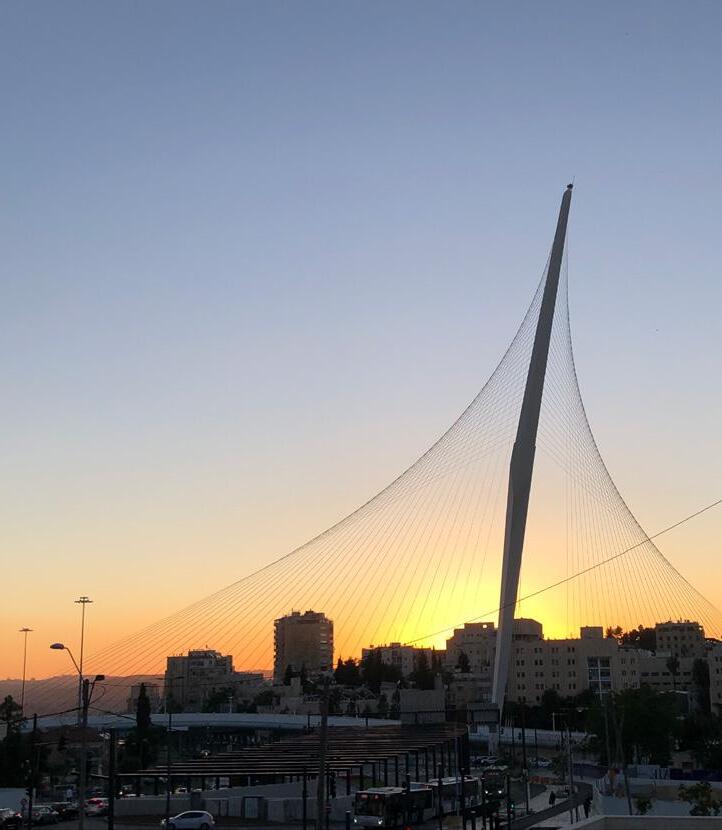
Most parents understand that for a younger child, instruction, guidance, and oversight are intrinsic to their roles as parents. Parents also know that just because
many parents face is figuring successfully adapt their relationship a younger child into an adult relationship with an adult child.
One reason this transition confusing is that the duration to adulthood, for many people, form and may stretch over many The traditional Western value, it was never reality for many that a person turns 18 and becomes responsible for himself. He starts some money, lives on his own, pays way, and looks to get married, short order. All of these lifecycle would indicate that the child has an adult.
But in today’s world, and especially frum communities, the markers hood are far less clear. Young typically not able to pay their own to some combination of advanced study, attending college or university, a higher cost of living. There emphasis on marriage, such
Aliya-by-Aliya
Rabbi
The
Rabbi Dr. Tzvi Hersh Weinreb
Minority
Rabbi
Probing
Rebbetzin
With an
A Prophetic Promise: Legacy of Our Land
Rebbetzin Dr. Adina Shmidman
Oneg Shabbat Activities
Rebbetzin Zemira Ozarowski
Return to Who We Are
Rabbi Aaron Goldscheider
Mezuzah for a Balcony
Rabbi Daniel Mann
True Witness
Gideon Weitzman
Parenting Column
Ethan Eisen
Reflecting on Marking Yom HaShoah, Yom HaZikaron and Yom HaAtzmaut in the Diaspora and in Israel
Rabbi & Rebbetzin Billet
Carpe Diem! Seize the Day!
Rabbi Eliyahu Safran
A 15 Year Old Who Gives Us Strength
Sivan Rahav-Meir
Torah 4 Teens by Teens
Moriah Goldsmith // Shua Golubtchik
Y-Files Comic
The Omer: A Mirror of History & A Roadmap to the Cosmos
Rabbi Moshe Taragin

Photographed by Leah Yerushalmi in Jerusalem
I made aliyah from Washington DC in 1970 and returned in 1977 to stay permanently. I live in French Hill, Jerusalem. I went on a guided tour to Israel’s South on Yom HaAtzmaut , where we paid our respects to those who were murdered and heard first-hand reports about the bravery of civilians and IDF soldiers on October 7th / Simchat Torah. This photo was taken the day after Yom HaAtzmaut. While the sunset is beautiful, its fire reminds me that we are still at war and are living in challenging times. My back was to the Temple Mount when I took the photo but I nonetheless said a prayer to myself in Hebrew when viewing the sunset: “May G-d grant peace over all of Israel, speedily and in our days”.
Last Opportunity to Say Kiddush Levana until: 14 Iyar/ Wed. night May 22
Yerushalayim/Maale Adumim
Aza Area (Netivot, Sderot et al)
Be’er Sheva
Mond/Herzliya/K.Saba
/ Givat Shmuel
Tzfat / Bikat HaYarden
Rabbeinu Tam (Jerusalem): Behar 8:53 PM • Bechukotai 8:57 PM
All Times According to MyZmanim (20 mins before Sunset in most Cities; 40 mins in Yerushalyim and Petach Tikva; 30 mins in Tzfat and Haifa)
All Times According to MyZmanim (20 mins before Sunset in most Cities; 40 mins in Yerushalyim and Petach Tikva; 30 mins in Tzfat and Haifa)
Daf Yomi: Bava Metzia 87 BECHUKOTAI
Daf Yomi: Kidushin 69
Ranges 11 days Wed - Shabbat
Oct x - x / x - x Cheshvan
Ranges 11 days Friday - Shabbat May 22 - June 1 / 14 - 24 Iyar
Earliest Tallit and Tefillin x:xx - x:xx
Earliest Tallit and Tefillin 4:40 - 4:35
Sunrise x:xx -
Sunrise 5:38 - 5:34
Sof Zman Kriat Shema
Sof Zman Kriat Shema 9:07 - 9:05
Avraham
Sof Zman Tefila
Magen Avraham 8:25 - 8:22 Sof Zman Tefila 10:16 (According to the Gra and Baal HaTanya)
(According to the Gra and Baal HaTanya) Chatzot (Halachic Noon) x:xx - x:xx
Chatzot (Halachic Noon) 12:36 - 12:37
Mincha Gedola (Earliest Mincha) x:xx - x:xx
Plag Mincha x:xx - x:xx
Mincha Gedola (Earliest Mincha) 1:10 - 1:11 Plag Mincha 6:06 - 6:11 Sunset (Including Elevation) 7:38 - 7:44
Seymour J. Abrams • Orthodox Union Jerusalem World Center • Avrom Silver Jerusalem College for Adults • Wolinetz Family Shul • Makom BaLev • Birthright • Yachad • NCSY in Israel • JLIC in Israel • Camp Dror • Pearl & Harold M. Jacobs ZULA Outreach Center • The Jack Gindi Oraita Program • OU Israel Kashrut
STUART HERSHKOWITZ, PRESIDENT OU ISRAEL Zvi Sand / Yitzchak Fund: Former Presidents, OU Israel | Rabbi Emanuel Quint z”l, Senior Vice President | Prof. Meni Koslowsky, Vice President
VAAD MEMBERS:
Michael Elman | Yonatan Frankel | Yitzchak Fund | Daniella Hellerstein | Stuart Hershkowitz | Jeremy Lustman | Meir Raskas | Atara Reichel | Zvi Sand | Norman Schmutter | Mark Schneider | Esther Williams RABBI AVI BERMAN, EXECUTIVE DIRECTOR, OU ISRAEL
David Katz, CFO, OU Israel | Natan Kandler, COO, OU Israel | Chaim Pelzner, Director of Programs, OU Israel | Rabbi Sam Shor, Director of Programs, OU Israel Center | Rabbi Sholom Gold zt"l, Dean, Avrom Silver Jerusalem College for Adults 22 Keren HaYesod <> POB 1441 <> Jerusalem 9101032 phone: (02) 560 9100 | fax: (02) 561-7432 email: office@ouisrael.org website: www.ouisrael.org
Sunset (Including Elevation) x:xx - x:xx OU Kashrut NCSY Jewish Action JLIC NJCD / Yachad / Our Way OU West Coast OU Press Synagogue/Community Services OU Advocacy OU Israel
MITCHEL R. AEDER, PRESIDENT OF THE ORTHODOX UNION Yehuda Neuberger, Chairman of the Board, Orthodox Union | Dr. Josh Penn, OU Kashrus Commission
RABBI MOSHE HAUER, EXECUTIVE VICE PRESIDENT | RABBI JOSHUA M. JOSEPH, ED.D. EXECUTIVE VICE PRESIDENT & CHIEF OPERATING OFFICER Rabbi Dr. Tzvi Hersh Weinreb, Exec. V.P. Emeritus OU KOSHER: Rabbi Menachem Genack, CEO/Rabbinic Administrator OU Kosher | Rabbi Moshe Elefant, COO/Executive Rabbinic Coordinator ISRAEL: Rabbi Yissachar Dov Krakowski, Rabbinic Administrator | Rabbi Ezra Friedman, The Gustave and Carol Jacobs Center for Kashrut Education/ Deputy Rabbinic Administrator Headquarters: 40 Rector St. 4th floor, New York, NY 10006 212-563-4000 website: www.ou.org
Editor Emeritus: Phil Chernofsky
Editor: Rabbi Aaron Goldscheider | aarong@ouisrael.org
Advertising: Ita Rochel | 02-5609125 or ttads@ouisrael.org
Website: www.torahtidbits.com
Not getting enough TTs? Too many? None at all? Contact our DISTRIBUTION 050-577-2111 • ttdist@ouisrael.org
Founders and initial benefactors of the OU Israel Center: George and Ilse Falk a"h
Torah Tidbits and many of the projects of OU Israel are assisted by grants from THE JERUSALEM MUNICIPALITY
OU Israel, Torah Tidbits does not endorse the political or halachic positions of its editor, columnists or advertisers, nor guarantee the quality of advertised services or products. Nor do we endorse the kashrut of hotels, restaurants, caterers or food products that are advertised in TT (except, of course, those under OU-Israel hashgacha). Any "promises" made in ads are the sole responsibility of the advertisers and not that of OU Israel, the OU Israel Center , Torah Tidbits.

Since October 7th, OU Israel has led over forty missions from North America to Israel. These are incredible groups of men and women, including rabbis, community leaders, and baalei batim who want to connect and help Israel in any way they can.
I gain so much from these missions. Firstly, I meet such wonderful people. People who care deeply about Israel and about the Jewish People. The time with them is quality time. I get to see what they are concerned about, how much they care, and after these intense trips are over, I always feel like I have made friends for life. It’s so valuable to me. Another thing that I gain is perspective. Visitors often notice things that we do not see because we live here.
We had a mission, including OU Executive Vice President & COO Rabbi Dr. Josh Joseph, that came for Yom HaZikaron and Yom HaAtzmaut in order to experience these days, which were so special and meaningful this year. Leading this mission meant taking Yom
RABBI AVI BERMAN Executive Director, OU IsraelHaZikaron and Yom HaAtzmaut, days that are intensely personal for me, and sharing them with others, which is not so easy. It was a zechut to help them see the heroism and the sacrifice that our soldiers and leaders have made; that is worth more than anything.
During the missions, we sit with the participants throughout their visits to discuss how the trip is going and to process what they are seeing and experiencing. We decided to hold one of these discussions right before leaving for a Yom HaZikaron tekes at Givat HaTachmoshet with the Michael Levin Base. We had just come back from Otniel, hearing Menachem Kalmanson talk about what he and his brother Elchanan HY”D did in Be’eri. Our group had also talked to security personnel of different communities down south, fully understanding the weight of the atrocities suffered by Klal Yisrael on that day.
OU Israel mourns the passing of our long-time faculty member
We wish nechama to his family and many, many students
Shiva until Friday morning his son Yoni can be reached at: 050-728-7455
There were obviously a lot of emotions to unpack and process. One of the incredible women in the group is a daughter of Holocaust survivors. She told me something that has lifted me up ever since. She shared that she has been to Israel over many decades and although she just arrived for this particular trip a few days prior, she noticed something she hadn’t seen in a long time. When she began to make trips to Israel, she said, she used to feel a spirit in the air of Eretz Yisrael - a sense of belonging, a sense of connection, of passion and purpose. However, she claimed, she did not feel it these last couple of decades until this trip. This is her first trip
since October 7th. And now, she not only feels this familiar spirit among the Jewish People again, but many times as much. Everyone feels unified, passionate, and connected to each other in a way that they haven’t in decades. She said that she always felt that that spirit would guide the Jewish People and ensure their success. But when it was lost, she was worried. Now, she is hopeful once again, with the confidence that Klal Yisrael will win.
To hear this was very powerful. It gave me a perspective I hadn’t seen before. Coming from a woman with Holocaust survivor parents, who had every right to be pessimistic about the future of the Jewish People, her optimism and hope hit me so much deeper. It meant so much to me and everyone else in the group as well. It really set the tone for the rest of the trip. Everyone was thinking about that spirit and sensing that our goal was to keep adding wood to that fire of spirit.
That’s what we did on Yom HaZikaron and Yom HaAtzmaut. We stood on Har Herzl and we hugged so many families who lost loved ones. We saw the pride that the parents had for their children who heroically gave their lives for the Jewish People, even while they were experiencing unbelievable pain. I heard from so many of them how they understood that it is a step in the redemption process of the Jewish People. This is the spirit that has come back to our people as of late.
Jen Airley spoke at OU Israel’s tekes maavar before our Leil Yom HaAtzmaut musical Tefila led by Rabbi Shlomo Katz, Mara D’Atra of Kehilat Shirat David. Jen spoke about how on Yom HaZikaron she went with her family to plant trees, because that’s what her son, Binyamin HY”D, did. She told the massive crowd how she chose to plant a grapevine

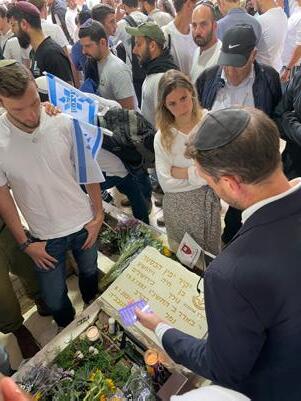
instead, because she wanted to show that she knew that the Jewish People will never leave this Land and that, with the help of G-d, we will move forward and plant our roots deeper and deeper in Eretz Yisrael. Afterwards, the festive davening with Rabbi Shlomo Katz was uplifting and inspiring, bringing us all to this spirit of simcha and hope for the future.
I was unsure how Yom HaZikaron and Yom HaAtzmaut would feel being busy with the mission. Yet, I realized that it was more impactful than I anticipated. On Yom
HaAtzmaut day, we ran a big carnival, together with Moshav Nechalim near Petach Tikvah, for the evacuees from Kiryat Shmona. The mission participants sat down with those who had been uprooted from their homes, hearing about the challenges that they have had, but also had fun at the carnival with them, bringing smiles and laughter to people who have not had it easy, to say the least, these last seven months. They also heard from David Silberman, who lost his son Uriel HY”D in battle in Gaza, and his story was so meaningful to hear on Yom HaAtzmaut.
Meanwhile, the children of Nechalim that were there were eating cookies named “Uriel Cookies” because they were made with Uriel’s cookie recipe. We ended the day with a barbeque for soldiers of the Oketz unit. It was a really special Yom HaAtzmaut. We shouldn’t take for granted that special spirit that Am Yisrael has. Sometimes it takes a woman from Florida, experienced and wise, to help us notice that spirit that is alive and among us. We should cherish it and continue to create meaningful times here in Medinat Yisrael. We should focus on the positive and appreciate the spirit of connectedness and love we are all experiencing right now. Let’s keep adding wood to that fire. Speaking of which, I want to wish you a very meaningful Lag BaOmer. Let’s enjoy our bonfires with our families and friends, and think about
those who can’t be with us right now. Let us pray that our hostages and brave chayalim come back very, very soon healthy and safe. Wishing you all an uplifting and inspiring Shabbat,
Rabbi Avi Berman
Executive Director, OU Israel aberman@ouisrael.org


Rabbi Avi & Pnina Berman & the OU









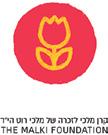
BAKA - New penthouse, 125m, on a pastoral street
In the heart of calm and pastoral BAKAPrivate arab house, 6 rooms, 500m + possibility of building 250m, huge garden, approx. 700m, completely renovated, underfloor heating + a/c, large parking, 5 bathrooms, 5 toilets, green
6200000NIS
MICHAEL 052-3202488
MENDEL 0528980111
ARNONA - Penthouse, 120m, with balcony 80m
4590000NIS
BAKA - New penthouse, 4 rooms in a small luxurious building with character, alone upstairs, 3rd floor + elevator, 4 orientations, 3 toilets, 2 bathrooms, terrace / sukkah, 70m, parking, store-room
ELISHEVA 052-6724003
BAKA - Buy 3 rooms and get 4 rooms after TAMA 38
5450000 NIS MENDEL 052-8980111
3100000NIS
MICHAEL 052-3202488
MOSHAVA / In a building after TAMA 38, new apartment, 4 rooms, 3rd floor + elevator, balcony/partial sukah, opened sight, 2 bathrooms, calm, parking
NEAR BAKA - Luxurious 130m apartment in a new building
MENDEL 052-8980111
6200000 NIS
MENDEL 052-8980111
BAKA / MEKOR HAIM - 4 rooms, 90m, 2nd floor + elevator, completely renovated, fireplace, a/c, gas heating, very central, close to all amenities
MENDEL 052-8980111
Near Arnona Hatzaira, in a step building, very large 5-room apartment + balcony/sukkah, 40m, renovated, 3rd floor, private entrance, quiet, potential for extra independent unit
MICHAEL 052-3202488
ARNONA – 3 rooms, that will be transformed to 90m, 3rd floor with elevator, store-room, parking
ONLY 2550000 NIS
MICHAEL 052-3202488
In the pastoral BAKA - quiet and central, stunning villa 350m, in a magical atmosphere, designed, pool, 4 bedrooms, cinema room and more, 4 bathrooms, garden, parking
MIKAEL 052-3202488
ARNONA HATZEIRA - Very spacious penthouse, 120m, 4th floor + elevator, huge terrace / succah, 75m, open view, 2 parking spaces, cellar, 3 toilets, quiet, completely renovated, immediate entrance
MICHAEL 052- 3202488

THIS WEEK:
Providing medicines (not in the government package) for several needy individuals
See What We Do and to Donate: www.Yeshezra.org
Bank transfer: Mercantile (17), Branch 642, A/C 79747843
Send Asmachta for tax receipt
Checks: “Yesh Ezra,” POB 31476, Romema, Jerusalem
Credit Card: Sara – 077-820-0196.
Sun/Mon/Wed (10:15am-2.45 pm)
Inquiries: Menachem Persoff 050-570-1067 | menpmp@gmail.com












We all put up walls. But there are different kinds of walls.
There are walls of distrust that we put up around ourselves as protection from those beyond those walls. It is those kinds of walls that lead to our parsha’s differentiation between the walled and the open cities and fields of Eretz Yisrael. The open areas cannot be sold for the long-term because, said G-d (Vayikra 25:23), “the Land is Mine and you are (only) My tenants in the Land.” Part and parcel of living in the Land of Israel is entrusting ourselves to G-d. This is expressed in the inherent vulnerability of day-to-day natural life in an arid climate that is dependent on rainfall from the Heavens (Devarim 11:10-12),
Commemorating the 1st Yahrzeit of Mrs Chana Homnick a”h
An Eishes Chayil in the truest sense
A loving mother, grandmother and great-grandmother She was a devoted daughter, sister, and loyal friend.
Homnick and Bulman Families
The Clara Hammer Chicken Fund
as well as in the embrace of dependence on G-d implicit in the Shemittah agricultural cycle, where we allow our fields to lie fallow for a full year based on the Divine reassurance of His blessing. Living in Israel is an expression of trust as we cede control of our own lives to G-d in a happy and trusting surrender: The Land is Yours, G-d, and we live here with You.
A walled city presents a completely different reality (Vayikra 25:30). The home built there can be sold forever with no return at the Yovel, the Jubilee year. The walls around that city are walls of protection, walls of distrust, walls that seek to control our fate and imply a lack of trust in anyone other than the fortifications that we ourselves can construct. The home inside those walls is not G-d’s because we have not trusted G-d enough to surrender it to Him. Without G-d, the Land is ours to sell and therefore to lose.
There is one exception, one walled city where this rule does not apply and that is Jerusalem (Bava Kamma 82b). The walls of Yerushalayim are not fortifications to provide us with physical security. They are not walls of distrust, but rather walls that define us and envelope us. Those walls create relationships within as they define the perimeter for the containment of kedushat Yerushalayim, the unique sanctity of the city wherein G-d is more present and where we may partake in sanctified and elevated activities. They are walls that invite G-d in rather than
and our next step will be to plant a fruit tree. I never thought of myself as being the agricultural type, but the feeling of settling and planting a portion of Eretz Yisrael, has been truly euphoric. Iy”H, when we plant our tree, and eat the fruits that will grow one day, I think we will be able to truly appreciate that unique Kedusha found in the fruit of Eretz Yisrael!
These are the kinds of walls that we should all be building around us, walls that create the space for our sacred and faithful relationship with G-d and for the trusting and intimate relationships with each other.
To conclude, when you buy your Tu B'shvat fruit this year, don’t search for those dried apricots and banana chips imported from Turkey. Rather, head over to the fresh produce and buy yourself some nice juicy Kedusha-filled Jaffa oranges and thank Hashem for bringing you to this land in order to be able to הבוטמ
, imbibing that Kedusha in every bite that you take!!

TRANSFER YOUR OLD FILM/VIDEO's (All formats) In Quality to Digital Preserve Family History from Fading Michael 052.286.8626 Photography with feeling Facebook.com/L'Dorot Photography keep others out. They are walls that build our relationship with G-d and our faith and trust in Him, as we pray every Shabbos: Av Harachamim heytiva b’rtzoncha et Tziyon tivneh chomot Yerushalayim; “Compassionate Father, favor Zion with your goodwill, rebuild the walls of Yerushalayim for we trust in You alone….”


Please make a donation for over 400 families of victims of terror with food for Shavuot.
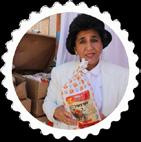










Concerning the Purchase of a Residence in Ma'ale Adumim
1. Purchasing bids ("Proposals") are welcomed concerning a 265 square meters private residence, built on a 500 square meter plot, + covered parking and a storage room, located at 7 HaGilgal Street, Mitzpe Nevo, Ma'ale Adumim (the "Property").
2. Written Proposals shall be submitted to the undersigned no later than June 6 2024 until 15:30, along with a bank check or a bank guarantee in the amount of 5% of the value of the Proposal.
3. The undersigned does not undertake to accept any Proposal whatsoever and reserves the right to conduct a competitive auction process. The rules applicable to a tender do not apply to this Notice.
4. For more details and to coordinate a visit to the Property, please contact the undersigned.
Adv. Ariel Naiman 23 Hillel St., 4th floor, Jerusalem Tel: 02-6221144 | Fax: 02-6221217 Email: hagilgal7@gmail.com

Parshat Behar is a short parsha of 57 verses. It is only one chapter plus 2 verses into the next chapter. It is the conclusion of the book of Vayikra; next week’s parsha, Bechukotai, is mostly the warnings of the blessings and curses at stake upon entry in the Land.
So, while continuing the theme of Kedusha that has been the preoccupation of this book of Vayikra, it pivots to address the Land. We know the rest of the Torah, so we know that the entry into the Land will be delayed 40 years, but at this point in the Torah we are on the cusp of entering the Land. The focus shifts from Kedusha in our relationship with G-d to Kedushat Haaretz, mitzvot related to the impending Land ownership.
But not what we call mitzvot hatluyot b’aretz – agricultural mitzvot, like teruma. Rather, social engineering expressed through real estate. In an agrarian society the land is
May the Torah learning from this issue of Torah Tidbits be in loving memory of my dear father on his 55th yahrzeit
born in Dolginov, White Russia
His daughter Raya, grandchildren, great grandchildren and great great grandchildren.
the way you make a living. Or more relevant –when it doesn’t go well, it is the source of your not making a living. The spiral of poverty begins with failure in agriculture.
The laws of this parsha are the Torah’s social engineering. How to help the impoverished, those struggling. In the excitement of knowing that shortly we will be land owners, the Torah insists that land ownership be tempered by concern for those whose land ownership is just not working out.
25:1-13)
Shemitah: The Land of Israel has its Shabbat. Work 6 years, the 7th is a Shabbat to G-d. What grows on its own is available to be used. Yovel: 7 cycles of 7 years is followed by Yovel, the 50th year, the Jubilee year. It is holy; pronounce liberty throughout the Land. Slaves go free; land returns to its original owner.
The theme of holiness is expanded yet again. We have had holiness in the Mikdash, our approach to Him in His home. We have had holiness in food. Holiness in relationships; those permitted and those not. Holiness in time; Shabbat and holidays. Now we are introduced to the holiness of the Land of Israel, Kedushat Haaretz.
Ironically, the first mitzvah related to ownership of land is not what you own but when you don’t own it. In the Shemitah year, our ownership is tempered. We still own the land. But not to the exclusion of others; anyone can come into the field and help themselves
to what grows in it.
And Yovel too is a temper on our ownership of the land. In a truly radical notion, land purchases are never permanent.
In Yovel, the slaves go free and the land returns to its original order. That is a radical notion; my purchase of this piece of land is only a temporary purchase. In the 50th year, it goes back to the original owner. This is the Torah’s version of bankruptcy. In modern bankruptcy we declare that the person is hopelessly in debt. So, give them a fresh start. Let’s start over. So too in a different form is Yovel. Every 50 years, the land, which is the primary source of livelihood in an agrarian society, goes back to its original owner. He gets a fresh start. If a person needed to sell his field it is only because he was in trouble financially. More so for the slave – he was really in trouble. Both get a fresh start.
It is this economic theory of protection of the less fortunate that is developed in the rest of the parsha. Economic theory is in no way my expertise. However, one could easily see the early Marxist theorists using Parshat Behar as support for discomfort with unbridled capitalism. The Torah has a robust safety net for those struggling; not sure whether that indicates a flaw in capitalism or merely a recognition from the dawn of our people of the need to share and help others get back on their feet.
2ND ALIYA (25:14-18)
When selling your land, do not abuse the buyer knowing the land will return to you in the 50th year. Sell it commensurate with the years the buyer will have until Yovel. Keeping these laws will allow you to be secure in the Land.
The land reverts to its original owner automatically in Yovel. If the buyer is unaware that
Yovel is in 3 years, do not sell at a price that would be for 40 years of use. It is not buyer beware; it is seller, be fair. Security in the Land is dependent not only on your loyalty to G-d, but on your fair business practice as well.
3RD ALIYA (25:19-24)
Do not be concerned that you will not have enough to eat if you rest the land; I will provide. Let the land not be permanently sold; for the land is Mine, you but sojourners on it.
We don’t go to the extreme and expect our food to fall from heaven while we merely sit and pray for it. We need to work for our lunch. But with limits. Divine blessing comes from doing the right thing. Rest on Shemitah after working for 6 years and He will provide. We hint at this with our 2 challot on Shabbat: on the day we don’t work, hey, a double portion. If you rest when commanded – double blessing.
4TH ALIYA (25:25-28)
If one becomes needy and sells his field, redeem it. The seller may also redeem it according to the years left until it returns to him in Yovel.
This section begins the development of the principle of intervention. When people are in trouble, help them out. The sale of a field cannot end well. It’s losing a job. In an agrarian society, what will this former landowner do for a living? This is the beginning of a downward spiral. Redeem his field; get it back for him, so he can make a living. This is the highest form of tzedakah; it is giving a person his job back. Redeeming the field is returning his way of making a living to him.
The Torah is legislating intervention. We cannot say: oh, that’s his problem. He got himself into trouble; he can get himself out. It’s not my business.
This is the financial parallel to “do not stand idly by your neighbor’s blood”. The Torah does not allow us to be innocent bystanders, not getting involved. If someone’s life is in danger, we are required to step in. And in our parsha, if finances are collapsing we are required to step in.
But the family connection is also noticeable. We must step in to help our family. There is a greater responsibility to family members than to others. Charity begins at home.
5TH ALIYA (25:29-38)
A house in a city may also be redeemed if sold, but only within the first year. After that, the sale is permanent. Homes in open towns are considered like fields; they may be redeemed and they return in Yovel. The towns of the Leviim, even if walled, are always able to
A shiur will be given on “TWO
by Rabbi Yitzchak Breitowitz
Thursday Evening May 30 (23 Iyar), 8:30pm Yakar Synagogue, Rechov HaLamed He 10 Jerusalem (accessible entrance from Kovshei Katamon)
Maariv to follow Light refreshments
Aliyah Lekever: Friday May 31 (23 Iyar), 10:00am Har Tamir, Jerusalem
be redeemed and they too return in Yovel. When one is in need, help him. Do not charge interest; give him life. I am G-d who took you out of Egypt to give you this Land and to be your G-d.
The Talmud points out that the progression here is from bad to worse. A forced sale of a field due to poverty. Then the sale of a home. Then the need for a loan. And in the next aliya, sold as a slave. The cheapest tzedaka is the first one; getting the field back, avoiding this whole collapse.
6TH ALIYA (25:39-46)
When one is sold to you as a slave, do not oppress him. Treat him as a worker. He goes free in the Yovel year. For you are My servants. Slaves purchased from the surrounding nations are as property that passes to future generations. Slavery makes us uncomfortable because we know the abuses of slavery and its demeaning of human dignity. But the Torah does allow slavery. I think we have to view slavery within the context of the economic approach of the Torah: help to the unfortunate rests on individuals. There is no government welfare system. The generosity expressed in elaborate welfare systems in our modern western countries is truly a wonderful and generous development, though, a very recent development. The Torah does not place care for the less fortunate on the shoulders of government but rather on the generous shoulders of our people. As such, there may be circumstances in which the financial predicament is so dire that slavery is the best option. It is far beyond the scope of this forum to present the elaborate laws of slavery as developed in the Talmud but Jewish slavery has many generous laws built
into it. But at least for the slave there is hope: freedom in Yovel.
7TH ALIYA (25:47-26:2)
When a Jew is sold to a non-Jew, a relative shall redeem him, for the Jewish people are servants to Me, My servants that I redeemed from Egypt.
In a beautiful expression of Imitatio Dei, imitating G-d’s ways, we are told to be like He was in Egypt. He took us out of Egypt; we too, should take our relatives out of slavery.
This week’s haftorah discusses the purchase of a field by Yirmiyahu, echoing one of the themes of this week’s Torah portion—the purchase and redemption of real estate.
Yirmiyahu was confined in King Zidkiyahu’s royal compound for having prophesied the destruction of Jerusalem and the exile of the Jewish people. There, Hashem reveals Himself to the prophet and informs him that he will be approached by his cousin Chanamel with an offer to purchase his ancestral lands. Hashem instructs Yirmiyahu to accept this offer. Indeed, Chanamel arrived in the compound with the offer, and Yirmiayhu accepted. Money was transferred and a document
of purchase was penned in the presence of witnesses. The prophet then gives the deed to his disciple Baruch son of Neriah for safekeeping, and instructs him to store it in an earthenware vessel where it will remain for many years.
Yirmiyahu then conveys Hashem’s message, the symbolism inherent in this transaction: “So says the L-rd of Hosts, the G - d of Israel: ‘Houses and fields and vineyards shall be purchased again in this Land.’” Thus conveying a message of hope even on the eve of destruction and exile. Yes the Jews would be exiled, but they would also eventually be returned to their Land.
32nd of 54 sedras; 9th of 10 in Vayikra. Written on 99 lines (ranks 50th).
7 parshiyot; 1 open, 6 closed.
57 pesukim (ranks 50th; 10th in Vayikra).
737 words (ranks 50th; 10th in Vayikra). 2817 letters (ranks 50th; 10th in Vayikra).
24 of 613 mitzvot. 7 positive, 17 prohibitions.
BY RABBI CHANOCH YERES R av, Beit Knesset Beit Yisrael, Yemin Moshe“For you are strangers and settlers with Me.” (25:23)
The great Dubnow Magid (Rabbi Yaakov Kranz 1740-1804) in his work “Ohel Yaakov”, asks how this pasuk could describe our relationship to G-d using contradictory words. Are we to become “strangers” or “settlers” in our Land? You seemingly cannot be both.
The Magid responds that the verse does hint that the relationship between yourselves and Me is always that of “strangers” and “settlers”. If you will live in this Land like strangers, understanding that you are here only temporarily, carefully behaving as a guest, then, I G-d, will become a permanent settler amongst you. However, if you misconstrue this Land as your permanent property and live here as permanent settlers, doing whatever you want under false misconceptions that you are the owners, then My presence will be that of a stranger and negate from living in your midst. If you, Israel, act like a stranger, then I will be a permanent settler. However, act as permanent settlers, then I must be the stranger. - Shabbat Shalom

It is a lesson I first learned in a course I took on the skills of interviewing long ago. The instructor taught us that the way to really size up a candidate for a job is to determine how he uses his time. He taught us that one question designed to assist the interviewer to make that determination is, “Where do you see yourself in five years?”
I have since had decades of interviewing experience in many diverse settings and have developed a set of other questions, all intended for the same objective. They include:
“What do you do in your spare time?”
“How would you spend your time if you won the lottery and no longer had to work for a living?”
And, in academic or rabbinic interviewing,
“How would you use your time if you were given a sabbatical leave from your position?”
It is this last question which brings us to this week’s Torah portion, Behar. In the very beginning, we read of the mitzvah of letting the land lie fallow (unsown) every seven years, which is the sabbatical year; also known as shemitah. “But in the seventh year the land shall have a Sabbath of complete rest, a Sabbath of the Lord: you shall not sow your field or prune your vineyard.” (Leviticus 25:4)
The Torah spells out quite clearly what can
and cannot be done in the way of tilling the soil. Indeed, there is an entire Tractate of Mishnah and Jerusalem Talmud which gives specific and detailed guidelines relating to the land and the produce of the shemitah year. I have always been intrigued and even a bit mystified, however, by the fact that, to my knowledge, nothing is said about what the farmer is supposed to do with his spare time that year.
Imagine a farmer who has been working industriously, 24/6, for six years. Then, as Rosh Hashanah of year seven approaches, very little work is permitted to him, and he becomes a gentleman of leisure. How does he use his time?
It is inspiring to note that there are pious farmers in Israel nowadays who scrupulously observe shemitah. And it is interesting that they indeed create structured programs for their “leisure” time that year. They study Torah, particularly the sections related to agriculture. They travel to farms across the country teaching less knowledgeable farmers halachot pertaining to farming. They even spend time updating their own technical agricultural skills.
There is a lesson to be learned here. The Torah legislates that the land needs a sabbatical year to lie fallow in order to renew itself. We must come to the realization ourselves that we too need a sabbatical year, but for us staying fallow is not our mission. Rather, it is to use such a time for physical, intellectual and spiritual reinvigoration.
The Torah continues to prescribe yet
another “leisure” year, a sabbatical year after seven sabbatical years, called the Jubilee year. “And you shall hallow the fiftieth year. You shall proclaim release throughout the land for all its inhabitants. It shall be a jubilee for you: each of you shall return to his holding and each of you shall return to his family.” (Levitivus 25:10) The personal, spiritual meaning of the fiftieth year of life was brought home to me recently. I have been re-visiting the writings of Hillel Zeitlin, a victim of the Holocaust. Zeitlin was a journalist, philosopher, and mystic who wrote a number of poems in the form of prayers, or perhaps prayers in the form of poems. One is entitled “On the Threshold of My Erev Shabbat”.
He writes in anticipation of his fiftieth birthday when he is about to enter the sixth decade of his life. “Life is like the days of the week, each decade a day. The seventh decade/ day is our soul’s Sabbath, and we are granted but seven days. I am at the brink of Friday, Erev Shabbat, for my tired spirit. I pray that my Friday be a proper preparation, that I can use it for personal repair. For five days I have wandered, nay strayed. This day I hope to re-discover the path, and return before Sabbath Eve’s sun sets.”
The journey of Zeitlin’s life was a tortuous one, and its theme was perpetual search. He wandered from shtetl and cheder to Western European philosophy; from secular Zionism to Chassidism; from Warsaw’s literary circles to its shtieblach; and ultimately to Treblinka. But his poetry, especially the one I translated above, displays an exquisite time-consciousness, an awareness of how fleeting our lives are, and we must work hard to fill them with meaning. Every seventh year is a sabbatical for the soul, and every fiftieth year, a time to
JERUSALEM SALES
NEW PROJECTS - Excellent Opportunities
Desirable Neighborhoods - Call For Information
SHAAREI CHESSED / RECHAVIA
*Duplex! 5 bdrms, 25 sqm kitchen, succah, shabbat elevator, 2 parking, storage.
*New 228 sqm duplex penthouse, 30 sqm succah, shabbat elevator, parking, view
TALBIEH - On Private Land
* Exceptional boutique building with 3 apartments on 900 sqm lot
*New 250 sqm + 200 sqm garden
NACHLAOT
2 rms, priv entr, storage room, NIS 2,190,000
OLD KATAMON
*Renovated 3 bdrm, ensuite MB, succah, low floor
*160 sqm 4 bdrms, garden, storage, parking
HAR NOF
Centrally Located– 10 room duplex with 400 sqm garden (room for a pool), excellent condition
MEKOR CHAIM - NEW PROJECT
126 sqm, spacious 4 bdrms, succah, 3 exposures, 2 parking, storage. Close to Baka & G. Colony
FOR MANY MORE PROPERTIES: 02-651-4030
recognize that we are past the zenith of our arc of life.
Fortunately, we have an even more frequent gift of time, and it is our weekly Sabbatical, Shabbat Kodesh, the Holy Sabbath. In the cycles characterized by the number seven, we have seven years, seven sets of seven years, and the seven days of the week. Jewish mysticism offers us a multitude of meanings for the number seven, but this much is not mysterious: There is a rhythm to our lives, and part of that rhythm calls for regular times for reflection and renewal. The intervals between such moments vary greatly in their duration. It is up for us to make the most of those moments, whether they last a day or a year.
I once heard a wise man, Rav Elya Lapian, say: “Modern man is convinced that ‘time is money’. Spiritual man knows that ‘time is life.’”
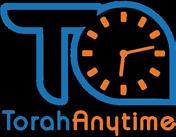

































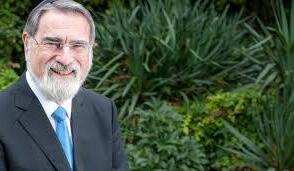
May the learning of these Divrei Torah be
HaRav Ya'akov Zvi ben David Arieh zt"l
One of the most striking features of the Torah is its emphasis on love of, and vigilance toward, the ger, the stranger:
Do not oppress a stranger; you yourselves know how it feels to be strangers, because you were strangers in Egypt. (Ex. 23:9)
For the Lord your God is God of gods and Lord of lords, the great God, mighty and awesome, who shows no partiality and accepts no bribes. He defends the cause of the fatherless and the widow, and loves the stranger residing among you, giving them food and clothing. You are to love those who are strangers, for you yourselves were strangers in Egypt. (Deut. 10:17-19)
The Sages noted that the Torah commands us in only one place to love our neighbour, but thirty-six times to love the stranger (Baba Metzia 59b).
What is the definition of a “stranger”? Clearly the reference is to one who is not Jewish by birth. It could mean one of the original inhabitants of the land of Canaan. It could mean one of the “mixed multitude” who left Egypt with the Israelites. It might mean a
foreigner who has entered the land seeking safety or a livelihood.
Whatever the case, immense significance is attached to the way the Israelites treat the stranger. This was what they were meant to have learned from their own experience of exile and suffering in Egypt. They were strangers. They were oppressed. Therefore they knew “how it feels to be a stranger.” They were not to inflict on others what was once inflicted on them.
The Sages held that the word ger might mean one of two things. One was a ger tzedek, a convert to Judaism who had accepted all its commands and obligations. The other was the ger toshav, the “resident alien” who had not adopted the religion of Israel but who lived in the land of Israel. Behar spells out the rights of such a person. Specifically:
If any of your fellow Israelites become poor and are unable to support themselves among you, help them as you would a resident alien, so they can continue to live among you. (Lev. 25:35)
There is, in other words, an obligation to support and sustain a resident alien. Not only does he or she have the right to live in the Holy Land, but they have the right to share in its welfare provisions. Recall that this is a very ancient law indeed, long before the Sages formulated such principles as “the ways of peace”,
obligating Jews to extend charity and care to non-Jews as well as Jews.
What then was a ger toshav? There are three views in the Talmud. According to Rabbi Meir it was anyone who took it upon himself not to worship idols. According to the Sages, it was anyone who was committed to keeping the seven Noahide commandments. A third view, more stringent, held that it was someone who had undertaken to keep all the commands of the Torah except one, the prohibition of meat not ritually slaughtered (Avodah Zarah 64b). The law follows the Sages. A ger toshav is thus a non-Jew living in Israel who accepts the Noahide laws binding on everyone.
Ger toshav legislation is thus one of the earliest extant forms of minority rights. According to the Rambam there is an obligation on Jews in Israel to establish courts of law for resident aliens to allow them to settle their own disputes – or disputes they have with Jews – according to the provisions of Noahide law. The Rambam adds:
“One should act towards resident aliens with the same respect and loving kindness as one would to a fellow Jew.” (Hilchot Melachim 10:12)
The difference between this and later “ways of peace” legislation is that the ways of peace apply to non-Jews without regard to their beliefs or religious practice. They date from a time when Jews were a minority in a predominantly non-Jewish, non-monotheistic environment. “Ways of peace” are essentially pragmatic rules of what today we would call good community relations and active citizenship in a multi-ethnic and multicultural society. Ger toshav legislation cuts deeper. It is based not on pragmatism but religious principle. According to the Torah you don’t have to be Jewish in a Jewish society and Jewish land


Jerusalem Real Estate is My Business Eta: 054-723-3863
Amazing stand alone homes in OLD KATAMON, TALBIYA, BAKA, GERMAN COLONY
GERMAN COLONY/TALBIYA 400 sqm on one floor parking storage large sukka terrace
Private home for sale
in the GERMAN COLONY. 500 sqm living space. New construction.
Call for more info
In GERMAN COLONY. 300 sqm plus 170 sqm registered garden. Plus parking and roof top terrace.
ARNONA exclusive: Fantastic cottage for sale, registered at 182 sqm plus ground floor unit (can be granny flat). Parking. Built on 3 levels with large terrace on 2nd floor. 5 bedrooms!!! Perfect for a young family.
Price 6,900,000 NIS
In BAKA, 236 sqm on two floors, plus 80 sqm of outdoor space, high ceilings, authentic Jerusalem bldg with modern addition. 4 bedrooms, office/ or sitting room. Master suite on entrance level. Parking & storage.

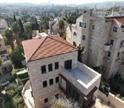

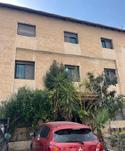

Morris Realty, Ltd. etamorrisrealestate@gmail.com Eta: 054-723-3863 etamorrisrealty.co.il
to have many of the rights of citizenship. You simply have to be moral.
One biblical vignette portrays this with enormous power. King David has fallen in love and had an adulterous relationship with Batsheva, wife of a ger toshav, Uriah the Hittite. She becomes pregnant. Uriah, meanwhile, has been away from home as a soldier in Israel’s army. David, afraid that Uriah will come home, see that his wife is pregnant, realise that she has committed adultery, and come to discover that the king is the guilty party, has Uriah brought home early. His pretext is that he wants to know how the battle is going. He then tells Uriah to go home and sleep with his wife before returning, so that he will later assume that he himself is the father of the child. The plan fails. This is what happens:
When Uriah came to him, David asked him how Joab was, how the soldiers were, and how the war was going. Then David said to Uriah, “Go down to your house and wash your feet.”
So Uriah left the palace, and a gift from the king was sent after him. But Uriah slept at the entrance to the palace with all his master’s servants and did not go down to his house.
David was told, “Uriah did not go home.” So he asked Uriah, “Haven’t you just come from a military campaign? Why didn’t you go home?”
Uriah said to David, “The Ark and Israel and Judah are staying in tents, and my commander Joab and my lord’s men are camped in the open country. How could I go to my house to eat and drink and make love to my wife? As surely as you live, I will not do such a thing!” (2 Samuel 11:6-11)
Uriah’s utter loyalty to the Jewish people, despite the fact that he is not himself Jewish, is contrasted with King David, who has stayed in Jerusalem, not been with the army, and instead had a relationship with another man’s wife. The fact that Tanach can tell such a story in which a resident alien is the moral hero, and David, Israel’s greatest king, the wrongdoer, tells us much about the morality of Judaism.
Minority rights are the best test of a free and just society. Since the days of Moses they have been central to the vision of the kind of society God wants us to create in the land of Israel. How vital, therefore, that we take them seriously today.
These weekly teachings from Rabbi Sacks zt”l are part of his ‘Covenant & Conversation’ series on the weekly Torah teaching. With thanks to the Schimmel Family for their generous sponsorship, dedicated in loving memory of Harry (Chaim) Schimmel. Visit www.RabbiSacks.org for more.
In loving memory of our beloved mother and bubby
Evelyn Weindling a”h
May the Torah learning from this issue be
on
Greatly missed by her children and grandchildren Marsha, Melissa and Becky Pottash Steven & Lizzie Weindling and Nan Abbot, Shoshanah-Ruth, Naftalia Maya, and Yaira Rachel Weindling and Lee DiTullio

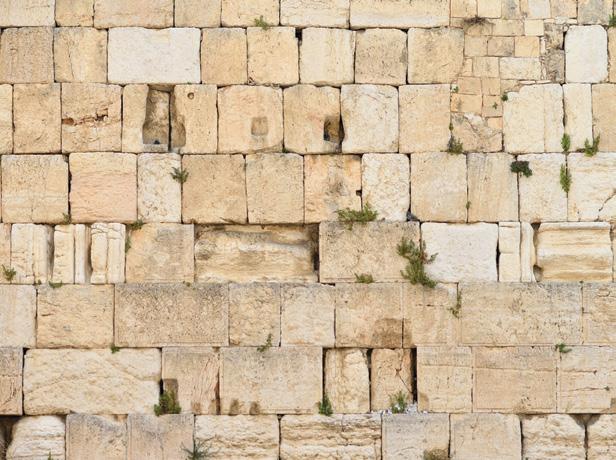
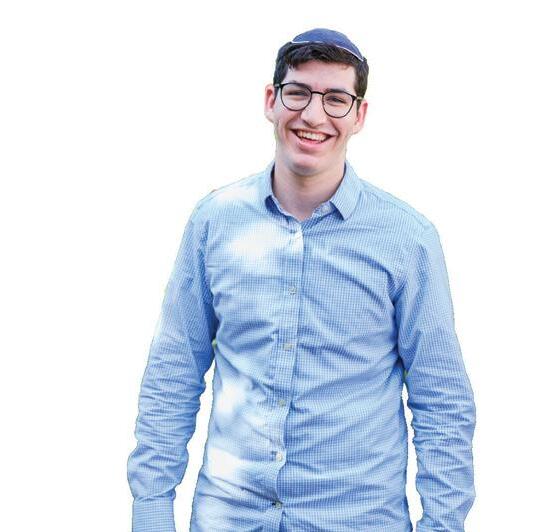



The navi Yirmiyahu was a most tragic figure, fated to live through the very horrors that he warned the people would befall them were they not to repent. Often referred to as the “prophet of doom,” he was vilified by his contemporaries for his ongoing rebuke of the sinful nation and was even cast into prison by the King’s officers - punished for his “traitorous” prediction of Judea’s fall into the hands of the Babylonians. We would be mistaken, however, were we to believe that he was no more than an irate firebrand whose only task was to censure and denounce his people.
In truth, Yirmiyahu was a reluctant agent of G-d, charged by Hashem to warn the Jews of the tragedy that awaited them were they to fail in abandoning their corrupt behavior. Fulfilling such a mission meant more than relating G-d’s fury to the people and threatening them with His punishments. The prophet’s charge had to include G-d’s assurance of His undying love for His nation, His pledge never to abandon His children and, ultimately, a promise of a better tomorrow. That is why the book of this “prophet of doom” includes his prophecies of hope and comfort.
And the haftarah, taken from perek 32, is one of those very chapters of reassurance, hope and nechama, consolation.
As our parasha focuses upon the laws of “ge’ula,” the obligation of a relative to redeem
any parcel of the family estate that had been sold due to poverty, so too this selection from Sefer Yirmiyahu tells of G-d’s command to Yirmiyahu to redeem an ancestral field of his cousin, Chananel. Although such an event would seem quite trivial and unnecessarily included in the prophet’s writings, once we understand the background of the entire story, we might appreciate its importance and regard it, as I do, one of the more moving and uplifting prophecies of Yirmiyahu’s life.
A simple reading of the text might lead us to believe that the chapter deals solely with the rather dry laws of redemption and purchase of fields in ancient Judea. But upon closer analysis a moving story unfolds before us.
The enemy was besieging the Holy City and building ramparts to enter Yerushalayim. At that same time, Yirmiyahu was imprisoned by the King Tzidkiyahu for having predicted the fall of the city and the capture of the king, who would be brought in chains to Babylonia. The furious regent questioned the veracity of the prophecy, denying that it came from Hashem. In order to convince his guards that he spoke the truth, Yirmiyahu prophesied that he would soon be visited by his cousin Chanam’el who would request that he redeem his field. Indeed, that is exactly what happened.
After going through the legal transactions
to return the field back to the family, the prophet turns to G-d with a logical but unexpected question. Yirmiyahu tells Hashem that he knows G-d is all-powerful and that there is nothing beyond His abilities. He continues and says, “The ramparts have reached the city (walls) and the city has been given to the attacking Chaldeans…..just as You said. And yet, you tell me to purchase the field with money and before witnesses-but the city is being given to the Chaldeans???!!” If, after all, Hashem promised that the nation would soon be exiled from her land would the logic of purchasing a field that would soon belong to the enemy!
But Hashem answered clearly - even before the question was asked. Indeed, there was a very important purpose for the purchase of the field, He explained. The people must know “Od yikkanu vatim v’sadot uch’ramim ba’aretz hazot”, “Houses and fields and vineyards will yet be bought in this land!” There IS a future! There IS hope! And the land WILL BE redeemed!! With these simple words, G-d comforts a soon-to-be exiled nation by assuring them that there will yet be a return and there will yet be a rebirth! And there will yet be a Land redeemed!!!!
And, today, all we need to do to see that redemption…. is look out of our windows.
Rabbi Winkler’s popular Jewish History lectures can be viewed by visiting the OU Israel Video archive: https://www.ouisrael.org/video-library

180m new penthouse on one level in Baka
5 rooms, large succah terrace, additional 40m storage, high ceilings, Shabbat elevator, parking, close to Nitsanim Synagogue. DEBORAH - 054-4804767
Unique penthouse on Smuts St., German Colony 300m spacious penthouse, private elevator, 6 rooms, double height ceilings, terrace Sukkah, boutique building. MAYA - 054-6650184
Perfect investment apartments in Talbieh Boutique project, 3 last apartments for sale of 56m, 2 spacious rooms + balcony. JULIA – 054-7007436
Small quiet lane of German Colony - New private house of 500m built, prime location, plot of 560m, 3 levels, possibility for a pool, high ceilings, full of character and light, views. DEBORAH - 054-4804767
In a fresh new building in Rechavia Luxurious 180m apartment on one level, 5 rooms, 4 bedrooms & Sukkah balcony. JULIA - 054-7007436
New development in the best German Colony Last 200m penthouse, 140m garden apartments, and 3-4 room apartments, Ready in 3 years. MAYA - 054-6650184
Unique luxurious 450m penthouse with private pool on rooftop in Talbieh - New boutique residence, high ceilings, several large terraces, private roof, magnificent views of Jerusalem, FOR SERIOUS BUYERS ONLY DEBORAH - 054-4804767
Model apartment for sale in a luxurious residence building in Talbieh - New 105m with 15m balcony. JULIA – 054-7007436
BEST INVESTMENT - PRESALE new development close to Baka - 2,3,4 & 5 rooms, terraces, gardens, private parking, ready in 3 years, great terms of payment!
Mazal Tov to Rabbi Chanoch & Esti Yeres and family on the birth of a granddaughter02-6744000 0544804767
www.real-estate-jerusalem.co.il deborah@realestatejerusalem.co.il

In Parshat Behar as well as in last week’s Parsha- Emor, we are instructed to count. Last week, we were informed of the obligation to count the days and weeks of the Omer as is stated:
And you shall count for yourselves, from the day after you bring the omer as a wave offering seven weeks; they shall be complete. In Parshat Behar we are commanded to count towards Yovel – the jubilee year, as is stated:
The difference between the two imperatives has significance. The Gemara (Menachot 65b) explains that the obligation is on each and every individual to count the Omer, hence the use of the plural. With respect to Yovel, the counting is the responsibility of the Sanhedrin (court). It is the duty of the Jewish people as a whole, performed centrally by the court, hence the singular.
And you shall count for yourself seven sabbatical years, seven years seven times. And the days of these seven sabbatical years shall amount to forty nine years for you.
Although both mitzvot require counting, there is a distinct difference that appears in the imperative that is often overlooked. Rabbi Lord Jonathan Sacks zt”l, in Lessons in Leadership cleverly highlights that with respect to the mitzvah of counting the Omer, the term םכֶל – in the plural, to count for yourselves is used. Whereas, with respect to the mitzvah of Yovel, the term used is ךָל – in the singular, to count for yourself.
Implicit in this distinction is an important principle of leadership. As individuals we count the days. We are occupied with our day to day matters. In contrast, leaders must think long term, with a focus on how current actions can impact the future. As Chazal stated: “Who is wise, one who foresees future consequences” - דלונה
(Tamid 32).
Throughout Jewish history we have witnessed how leaders focused on the future. During the time of the destruction of the Beit Hamikdash, Rav Yochanan Ben Zakai asked Vespasian
(Gittin 56b). Rav Yochanan Ben Zakai knew that to ensure the continuation of the Jewish people, a center for Torah study where tradition can be transmitted from generation to generation was essential.
In Pirkei Avot, the Anshei Knesset Hagedolah made edicts and gezerot to ensure that in exile, the authenticity of Torah will not
be compromised. They contemplated what was needed in order to protect Torah in the diaspora for future generations.
A story is told of Honi HaMa’gel (Taanit 23), who was walking along the road and saw an elderly man planting a carob tree. Honi asked him how many years it takes for a carob tree to bear fruit. The man replied, “70 years”. Honi was puzzled as to why the man would toil if he would gain no benefit from the tree. The man replied – when I came into this world there were carob trees. My ancestors planted for me. I too am planting for my descendants. A clear depiction of a man with an eye toward the future!
Each of us is a leader in a variety of capacities. In our families, on boards or committees of shuls and community centers, and to an extent at our places of work. Unfortunately, in contemporary culture, the focus is all too often on the present moment. Attention spans are short, and today’s headlines are what matters. Instant fame is favored, and an emphasis placed on the here and now rather than on what tomorrow may bring. The leadership challenge of Behar is to count the years, not only the days. We ought to ensure that when making important decisions we keep an eye focused on the effect it may have on the future as well.
As we are currently between the celebratory days of Yom Ha’atzmaut and Yom Yerushalayim, may we merit that Hashem bless our leaders with the proper wisdom to make the correct decisions for our country and nation.
Capital Property Consultants and Lily Lewit present: 3 OUTSTANDING, EXCLUSIVE JERUSALEM PROPERTIES FOR SALE
Original Arab/Templar house
550sqm plot
Building rights
Free-standing
Extremely quiet location
Fabulous Arab house
650sqm of living space
Building rights
45 sqm store front with business license
Garden parking
Superb mansion
570 sqm recently built 11 Bedrooms 8 Bathrooms
Quiet street off Emek Refaim
400sqm private garden

Our parashah opens with the mitzvah of Shemitah, the Sabbatical year. “Vayedaber Hashem el Moshe behar Sinai lemor – Hashem spoke to Moshe at Mount Sinai,” (Vayikra 25:1) telling him to speak to Am Yisrael and teach them the laws concerning Shemitah. Rashi famously comments, “What is [unique about the mitzvah of] Shemitah, [more than other mitzvot, that the Torah needs to emphasize that it was told to Moshe] at Mount Sinai?” Rashi concludes that it is to teach us that just as this mitzvah was given with its accompanying details and principles at Har Sinai, so too, every mitzvah was taught at Har Sinai with its accompanying details and principles. The question begs itself, why is specifically this mitzvah chosen to be the example?
The Ohr Hachayim Hakadosh notes that this mitzvah is particularly connected to the Land of Israel in that our residence in
Mazal Tov HONEY on your 100th Birthday
Much love Marcelle
Mazal Tov to Ranit & Ariel Kotler on the Bar Mitzva of their son Eitan!
Mazal Tov to the Grandparents: Bayla & Rav Shmuel Gamliel and Yehudit & Rav Itzhak Kotler
the Land is predicated on the observance of Shemitah. Using this mitzvah as the example underscores the imperative of upholding Torah law in the Land of Israel. The link is crucial; living in Eretz Yisrael must include not only the laws associated with the Land, but also the observance of Torah in its entirety.
We find a fascinating answer in the writings of the Chatam Sofer. A unique feature of the mitzvah of Shemitah is the Divine promise that the Land will yield enough produce to sustain its inhabitants for the sixth, seventh and eighth years of the Shemitah cycle. Only a Torah whose source is Divine can make such a promise. We can thus extrapolate that every other mitzvah in the Torah originates from Hashem speaking to Moshe Rabeinu at Har Sinai. Rav Elya Lopian observes that throughout Tanach and Midrash we never see people complaining about lack of food when they kept the laws of Shemitah. This resoundingly affirms the Torah assurance of prosperity in the land when Shemitah is observed properly.
Rav Moshe Scheinerman in Ohel Moshe
Mazal Tov to Leora & Shmuel Jacobs on the birth of their son
To the Grandparents: Esther & Rav Ari Jacobs and Yehudit & Rav Itzhak Kotler
adds that this mitzvah is bolstered by a distinctive siyata dishmaya. “Vetziviti et bircati lachem – I will direct my blessing to you.” (Vayikra 25:21) Hashem avows that all who keep this mitzvah will enjoy tremendous blessing. Yet this special Divine assistance is not limited to the mitzvah of Shemitah exclusively, Hashem is there to help us carry through each mitzvah that we do.
We must recognize that every mitzvah includes an essential Divine-help factor so we can succeed. We find that Rabbeinu Yonah describes the mitzvah of teshuvah in a similar fashion. When we seek to return, Hashem helps us move beyond our limitations to achieve closeness. If we express true desire and focus, Hashem is present to help us prevail.
The period of time marked by Sefirat Haomer is a beautiful model of this concept. After Rebbe Akiva’s students all perished in a terrible plague, he refused to capitulate under the crushing tragedy. He went down south and taught a handful of students. All of the Oral Torah is based on the teachings of those few students. Rebbe Akiva not only learned but lived this lesson of Shemitah - one must recognize Hashem’s direct involvement and interest in our efforts and never give up hope to strive for greatness.

ISRAEL’S LEADING REAL ESTATE NETWORK
FOR SALE IN JERUSALEM: YEMIN MOSHE
Unique picturesque home with views to the Old City, 174 sqm, 5.5 rooms, arched ceilings & windows, separate entrance unit, close to parking, walking distance to the Old City, Mamila, Major hotels. Nava 053-6642512
KIRYAT SHMUEL (HARAV BERLIN)
Large, well-maintained, 3 rooms, second floor, view, Excellent location: near shops & cafes, parks, museums, synagogues, schools. Anita: 053-6318355
FOR SALE IN GUSH ETZION: EFRAT (HAGEFEN)
Beautiful 6-room garden apartment, 133Sq.m., modernly designed & renovated, nice large garden + patio, private entrance, near Synagogues, community - commercial & health services, public transportation. Sigalit: 053-6302548
3 Moshe Hess St., Jerusalem 0778038511

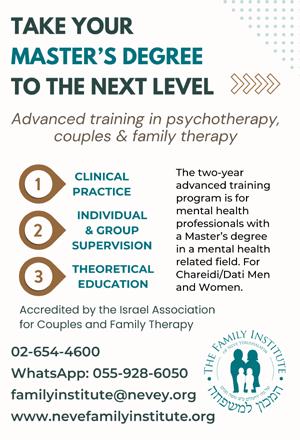

Executive Director, Camp HASC
Author of Baderech: Along the Path of Teshuva (Mosaica 2021)
Executive Director, Camp HASC
Author of Baderech: Along the Path of Teshuva (Mosaica 2021)
Rav Yaakov Galinsky, zy’a, a scion of Yeshivas Novardok in Bialystok, was a traveling maggid and baal Mussar, an inspiring speaker and towering personality. In 1939, Rav Yaakov was exiled and spent a number of difficult years imprisoned in Siberia. While in the gulag, he would rise early in the morning to daven before the other prisoners woke up. One day he noticed a fellow prisoner who would wake up early as well. Each morning, the prisoner, a Polish national, would remove a folded uniform kept hidden away under his bed, put it on, stand up tall and salute, holding the position for a few moments. He would then quickly take off the uniform, scurry it away under his bed until the next morning.
One day while working together on a hard labor detail, Rav Galinsky asked his fellow prisoner about his enigmatic, secret daily ritual. “My whole life I have been committed to serving my country, and since I was a little boy, dreamt of becoming a general in the Polish army. I finally achieved the rank of general — just before I was captured by the Russians. Now in captivity, everything I had worked for, everything I wanted to become, was gone. So early in the morning, I don my uniform, and I am my true self. Regardless of how the Russians or our fellow
prisoners see me, for those few moments, when I am wearing that uniform, I am not a lowly, broken inmate, but a proud general in the Polish army.”
Our sedra describes the ‘posture’ in which Hashem took us out of our constricted state of slavery in Egypt:
“I am Hashem, your God, Who took you out of the land of Egypt from being slaves to them; and I broke the pegs of your yoke and led you upright.” (26:13)
Rashi quotes Midrash Toras Kohanim: komemiyus, upright, means הפוקז
, ‘erect in stature’, due to our relief from bondage. After generations of suffering and slavery Hashem delivered us from exile, and not just physically, but by restoring our posture, our ‘stature’, our life-force, our inner light, our true self — our soul.
We are approaching the great day of Lag baOmer, the Hilulah, celebration of the Tanna Rebbe Shimon bar Yochai, when Rebbe Shimon revealed the Holy Sefer haZohar to his closest disciples before leaving the world. The Zohar is the textbook of Jewish mysticism, the secrets of the Torah, a sefer of inner brilliance and deep wisdom. It is a guidebook to navigating the world of the soul, and it allows us to see that there is a reality beyond that which we can sense, measure or understand. It was not merely mystical knowledge and
lofty ideas that Rashbi conveyed to his disciples, and to us. Rebbe Shimon inspired a renewed, inner perception of the Torah and helped them grasp the secret of Creation: to see and connect to the hidden spark of God, the P’nimiyus, the inner Truth and Light of all of reality.
Rebbe Shimon bar Yochai lived after the destruction of the second Beis haMikdash. When the Temple stood, Am Yisrael’s relationship with Hashem was an obvious fact. After its destruction, Hashem’s existence was concealed and the Shechinah was exiled. In this world darkened by destruction and exile, the Zohar revealed, and continues to reveal, hope and meaning by opening our eyes to our true life-force and the reality of G-d’s plan and involvement in whatever happens. Beneath the surface of world events, there is an inner reality that is pulsating, alive, shining with Hashem’s Light.
When Rebbe Shimon bar Yochai first emerged from the dark cave where he had been hiding from the Romans, he saw an imperfect world and people with flaws and spiritual lackings, and burned everything up with his judgmental gaze. Following a second period of personal refinement, when he was able to emerge again from the cave, Rebbe Shimon saw positivity, light and holiness in others and the world.
Jewish identity is rooted in our recognition that beneath our surface we exist as a soul; we are inextricably bound with the Divine Essence. That is our defining quality. Revealing that infinite soul-source hidden away within us is to truly come alive.
Each of us is a soul who has descended to this world on a mission, with a purpose. In a world struggling through the final stages of exile, we are charged with responsibility,
opportunity and privilege to come alive, to don our ‘uniform’ and stand upright, המוקב הפוקז, filled with pride in who we are. ימ
“Let all who turn darkness to light, bitterness to sweetness enter.” May we recognize the exalted nature of nishmas Yisrael — and be zocheh to enter the gates of Redemption, together.
Sgt. Maj. Aviad Cohen, hy”d, a young father and soldier in the Etzioni Brigade, was killed while fighting jihadist terrorists on Simchas Torah, October 7th, 2023. A couple of months later, in advance of Purim, his wife posted the following notice on the door of their home: “Happy Purim! You are asked to enter this home הפוקז המוקבו
שארב with your head held high and standing tall! Fill yourself with strength and happiness; only then may you knock on our door. We are the family of a hero who spread light and hope during his life and with his death. We are proud of all of you.”
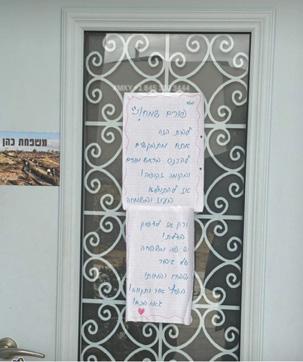
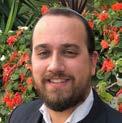
The prohibition
According to Biblical law, food that is completely kosher and cooked by a nonJew is permitted. However, our Sages decreed that such food, even when cooked in kosher utensils, is prohibited for consumption. This prohibition is known as bishul akum. In the coming weeks we will discuss the parameters of this rabbinic prohibition, including the reasons behind the decree, when it applies, and the practical halacha for modern industrial kashrut.
Our Sages decreed that one may not eat kosher food cooked by a non-Jew, out of concern for unnecessary social mingling that could lead to intermarriage. Previous articles here have discussed bishul akum in the context of non-Jewish employees and household help, citing sources from early and modern rabbinic authorities. With that information in mind, we will now turn to the much more sensitive and complex subject of foreign caregivers.
It is very common for elderly individuals, as well as the physically or mentally disabled, to have full-time assistance from a non-Jewish caregiver. In many cases the caregiver lives with the “patient”, performing nursing care and assistance with mobility in addition to household tasks like cooking. The question then arises: would the patient be halachically prohibited from consuming food cooked by his caregiver?
Food is a very connecting element in every society. That is the basis behind the decree of bishul akum. Our Sages were very concerned about close relationships with non-Jews since intermarriage is a very severe transgression. The prohibition effectively limits Jews and gentiles dining with each other, although there is no specific prohibition against dining with a non-Jew per se. (See Rashi on Avodah Zara 31:b.)
The OU Israel family wishes Mazal Tov to
Forbidding the non-Jew’s cooking would be enough to create an emotional distance such that families wouldn’t marry into each other.
Rabbi Shimshon & Na’ama Nadel and family on the Bar Mitzvah of their son Ben Tzion
Rabbeinu Tam (Tosfot Avodah Zara 38:a) and Rambam (Ma’achalot Asurot 17:9)
maintain that the decree is based on this issue of closeness to non-Jews that could lead to intermarriage; this is the opinion of most early authorities. However, Rashi and others attribute a different reasoning to the prohibition of bishul akum, which is that non-Jews might mix non-kosher ingredients into the kosher food. In future articles we will discuss whether the parameters of bishul akum are based on both of these reasons or just one. However, it is clear from numerous sources that the danger of intermarriage is the main reason behind the prohibition (See Torat Habayit 3:7).
The decree is binding regardless of the reason
In many instances, these caregivers are foreign workers with contracts that allow them to stay in a country (such as Israel) only for the sole purpose of being a caregiver to the elderly or those in need. As mentioned in previous articles, according to Rema and others, if there is a relationship of coercive service between the non-Jew and Jew and the cooking takes place in a Jewish home, there is room to be lenient ex post facto. Some authorities are of the approach that since foreign workers have binding, time-allocated contracts, and since termination of employment might trigger immediate deportation, their situation amounts to coercive service such that the laws of bishul akum do not apply to them (see Pesakim U’tshuvot 113:12). This position is debatable, both because workers can potentially change employers without being deported, and because the freedom of such a worker is much more extensive than the situation discussed by rabbinic authorities over 250 years ago. It would seem this dispute is dependent on the practical reality of the legal status of a foreign caregiver (see Kashrut Hashulchan p.92-93).
CHOLEH SHEYESH BO SAKANA
Since the transgression of intermarriage was the primary concern behind our Sages’ decree, their goal was to powerfully discourage the possibility of developing emotional connections to non-Jews that could lead to intermarriage either in that generation or the next. Accordingly, early authorities discuss whether the prohibition of bishul akum still applies even in situations where intermarriage is not technically possible. For example, Rashba, in his responsa (1:248), examines the case of food cooked by a priest. Being that Catholic priests do not marry nor do they have children with whom to intermarry, is it permitted to eat food cooked by a priest even though the reason for bishul akum seemingly does not apply to
While there is halachic disagreement


The OU Israel Gustave & Carol Jacobs Center for Kashrut Education was created to raise awareness and educate the public in all areas of kashrut. Rabbi Ezra Friedman, Deputy Rabbinic Administrator for OU Kosher Israel is the Center's director. him? Rashba answers that we have a rule regarding rabbinic decrees: even when the reason does not apply, the prohibition still stands. This is a necessary element in every rabbinic prohibition. Otherwise, Rashba explains, people could rationalize and find reasons why any decree should not apply in their particular situation. Accordingly, Rashba concludes that even food cooked by a Catholic priest has the prohibition of bishul akum ruling is made by Ramban 35:a) regarding non-Jewish royalty who, because of their stature, are prohibited from marrying Jews. He maintains that the fact that the non-Jews are royalty is irrelevant, and that the decree of bishul akum stands regardless of the reason behind it. Taz (YD 112:1) , Shach (YD 112:4) and Pri Megadim (YD 112:1) cite these rulings as axioms of the laws of bishul akum.
Other examples
over whether an elderly person may allow a non-Jewish caregiver to cook food for him without any intervention, it is certainly per missible when the elderly person is considered a choleh sheyesh bo sakanah, referring to a sick person who is in danger. This obviously includes those who are termi nally ill or severely injured, as well as individ uals with serious medical conditions, although the halachic designation is slightly broader. Any action to cure or care for a bo sakanah is part of our Sages’ ruling called “pikuach nefesh”, which means that in order to save a life, most halachically prohibited actions are permitted. This could include desecrating Shabbat/Yom Tov, or feeding non-kosher food to the ill (if needed). In a case where a person has limited mobility and cannot perform basic tasks on his own, he is also considered a choleh sheyesh bo sakanah. In addition, if the sick person cannot prepare food by himself or properly order and handle food, it is certain that there is no prohibition for a non-Jewish caregiver to cook kosher food him (Responsa Or Sameach 2:21).
CHOLEH SHE’EIN BO SAKANAH
Later authorities discuss similar cases where the logic behind bishul akum may not apply. Responsa Shevet Kehati (6:273) rules that even food cooked by a non-Jewish child is considered bishul akum, despite the fact that the chances of marriage seem remote. The same is true for food cooked in a faraway country where Jews cannot travel -- bishul akum still applies.
In summary:

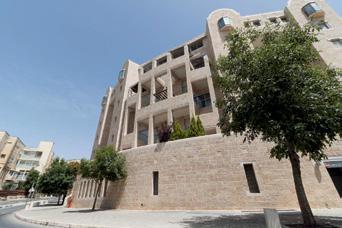
basic activities, or has a deficient mental state. There are dozens of examples for the definition of a choleh she’ein bo sakanah and numerous laws relating to this definition (see Talmudic Encyclopedia, entry “Choleh”).
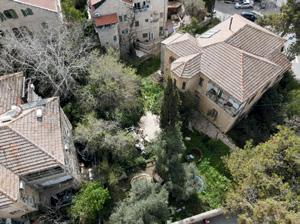
BAKA: New 4 room apartment in a new building, 88m, master suite, storage, Shabbat elevator, private parking, 3,950,000 NIS
RECHAVIA: 4-room apartment, 92m, Suka balcony, Shabbat elevator, fully accessible, private parking, storage 4,400,000 NIS
Regarding bishul akum done by a non-Jewish caregiver for a choleh she’ein bo sakanah, two issues need to be addressed, the first being the definition of a choleh she’ein bo sakanah and his need for a caregiver, and the second being whether the prohibition of bishul akum is applicable under such a situation.
ARNONA: 5-room apartment, 120m, balcony, elevator, fully accessible, private parking, storage 4,350,000 NIS
BAKA: 5-room garden apartment, 140m, master suite, private parking, storage, full of light, airy, nice garden, 5,000,000 NIS
OLD KATAMON: Spacious new 5-room penthouse, 155m, terrace, great panoramic view, underfloor heating, Shabat elevator, 2 parking, + rental unit, 8,900,000 NIS
FOR RENT: BAKA: nice 4-room apartment, 82m, beautifully renovated, master suite, air conditioners, balcony, 2nd floor, elevator - fully accessible, storage, 8,000 NIS
Our Sages prohibited food cooked by
In Jewish law there is another category of the ill, called a choleh she’ein bo sakanah (literally “a sick person not in danger”). While this halachic designation is very broad and quite hard to define, in simple terms it includes an individual who is not currently in danger but because of illness is either in constant need of rest, is in serious pain, requires physical help to conduct
Regarding the designation of certain elderly individuals as cholim, R. Meir Simcha
of Dvinsk (Responsa Ohr Sameach 2:21) addressed the question of an old-age home whose residents are not in immediate risk but are certainly considered cholim she’ein bahem sakanah. In Orchot Shabbat (20:176), a modern work on the halachot of Shabbat, the author analyzes the status of older individuals who are not critically ill. He rules that not every elderly individual, even above the age of 85, is considered a choleh. However, in many cases, when a person is unable to complete daily activities and is in constant need of rest as a result of his weakness, there is room to consider such an individual as a choleh she’ein bo sakanah. He later quotes Rav Yosef Shalom Elyashiv that concerning the elderly there is no absolute rule, and medical staff as well as rabbinic authorities should be consulted on a case by case basis.
Regarding the second issue of bishul akum for a choleh she’ein bo sakanah, although there is a minority opinion that any choleh she’ein bo sakanah may consume bishul akum, the overwhelming consensus is to the contrary. Based on the Shulchan Aruch itself (YD 155:3), the majority of rabbinic authorities rule that one may not serve a choleh she’ein bo sakanah any rabbinic prohibitions (such as medications made from rabbinically prohibited foods) unless there is a very specific halachic/medical need.
However, in a case where there is doubt regarding the health status of the individual, there are numerous other halachic considerations. As mentioned above, there are opinions that foreign workers are not part of the decree of bishul akum. In addition, all food is being cooked in a Jewish home, which according to certain early authorities is permissible. Finally, it is quite difficult and expensive to find Jewish help to provide meals for the elderly (see Minchat Asher, Bishulei Nochrim). As such, although each of these factors alone would not permit bishul akum, when combining them (foreign worker status, Jewish home, choleh and major financial burden) one may be lenient (see Knesset Hagedolah 113:8, Responsa Rav Pe’alim 4:6). It should also be noted that Rav Eliezer Waldenberg, the acclaimed 20th-century posek, was lenient in a similar case (Responsa Tzitz Eliezer 21:61). Because no two cases are ever the same, however, it is imperative that one consult with a halachic authority before allowing a foreign caregiver to cook for an elderly relative.
IN SUMMARY:
• There is a dispute amongst later authorities regarding the application of bishul akum to modern-day foreign caregivers.
• A Choleh Sheyesh Bo Sakana is allowed to consume bishul akum this includes a full time non-Jewish caretaker.
• There is a dispute whether a Choleh She’ein Bo Sakanah may consume bishul akum from a caretaker. One should consult with a competent halachic authority.






This Motzai Shabbat we will commemorate Lag B’Omer, when we reflect on the tragedy that befell the 12,000 pairs of students of Rebbe Akiva. Indeed most of us associate Lag B’Omer primarily as the end of the customary mourning period for Rebbe Akiva’s many students who were lost.
However, our Chazal teach us that following the tragedy that befell those many students, Rebbe Akiva started again from the beginning and developed a new generation of disciples including Rebbe Shimon Bar Yochai, who restored the glory of Torah throughout Eretz Yisrael. Of course Lag B’Omer is observed as the hillula, the celebration of the life and legacy of Rebbe Shimon Bar Yochai; the Arizal, referred to Lag B’Omer as yom simchato shel Rashbi- The Celebratory day of Rashbi.
The obvious question is what is so significant about Rebbe Shimon Bar Yochai, what makes Rebbe Shimon so unique, that we celebrate his life and legacy perhaps more significantly than any of our other tzadikim?
Rav Moshe Wolfson, shlita points out that Rebbe Shimon Bar Yochai learned from his teacher Rebbe Akiva, that every single letter in the Torah contains many thousands of secrets, each letter is valuable and important well beyond its face value. Rebbe Shimon Bar Yochai explained further that every single Jewish soul corresponds to an Ot ,a letter in the Torah. If each individual letter contains immeasurable secrets and meaning, then so too we must infer that every single neshama has immeasurable value and significance!
Rav Wolfson suggests that Lag B’Omer is indeed the tikkun for the tragic episode of the 12,000 pairs of Rebbe Akiva’s students, who failed to see the value in one another’s scholarship, and failed to treat each other with dignity and respect. We celebrate the life of Rashbi, as his legacy serves in contrast to Rebbe Akiva’s earlier disciples, and reminds us of the inner importance and sanctity of each and every member of Klal Yisrael.
The Bnai Yissascher, Rebbe Tzvi Elimelech of Dinov, zy’a, further explained that this entire period of Sefirat Haomer, is essentially a time to work on our midot. The Rebbe taught that there are forty-nine days of the Omer period, which corresponds in gematria to the words lev tov, a good heart. During these days, we must strive to let go of any negativity, jealousy, rivalry or strife, which might be harming our relationships with one another.
Yehi Ratzon, may we merit to heed this insight of the Bnai Yissascher, and to emulate the path of Rebbe Shimon. May we learn to see the good in one another and to appreciate that each and every neshama is both unique and sacred.
Lag Sameach!
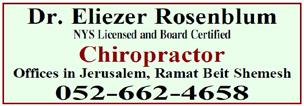



• Curtains & draperies
• Designer curtains
• Venetian & Woven wood blinds
• Blackout, Vertical, Roller, Roman & Pleated shades

www.ashleywilde.co.il

For Sale: Great New Building
Under construction in Talpiot. 2-5 rooms. Starting at 2.09m shekel.
For Rent in Katamon
30m studio on Bustani street, ground floor, small garden, for independent people over 55. 3500nis/month incl va'ad, hot water and heat.


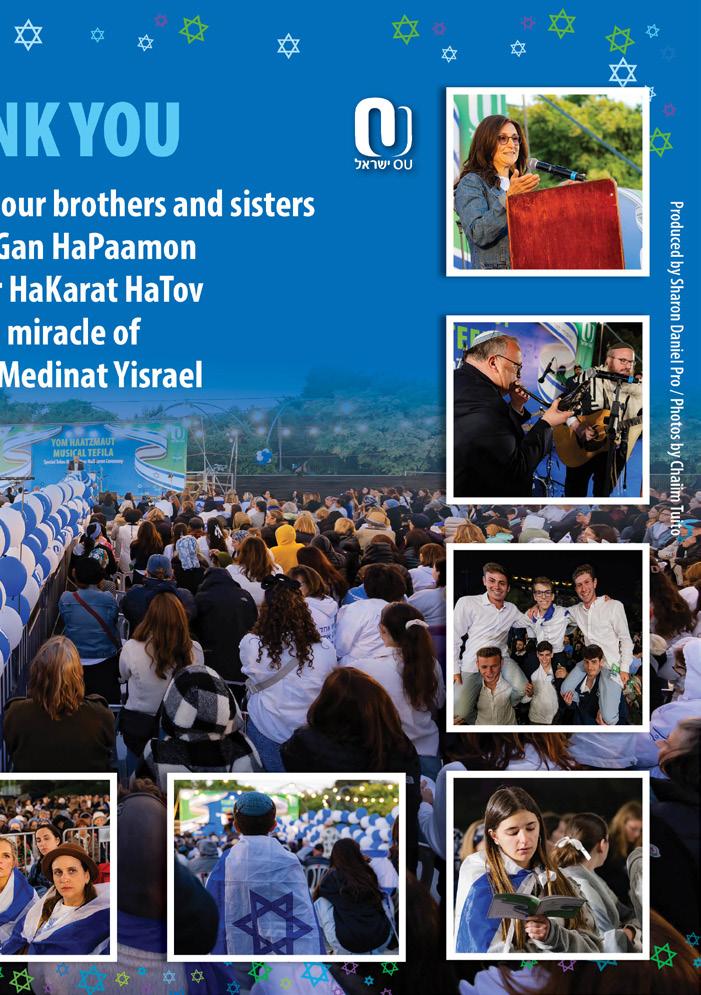
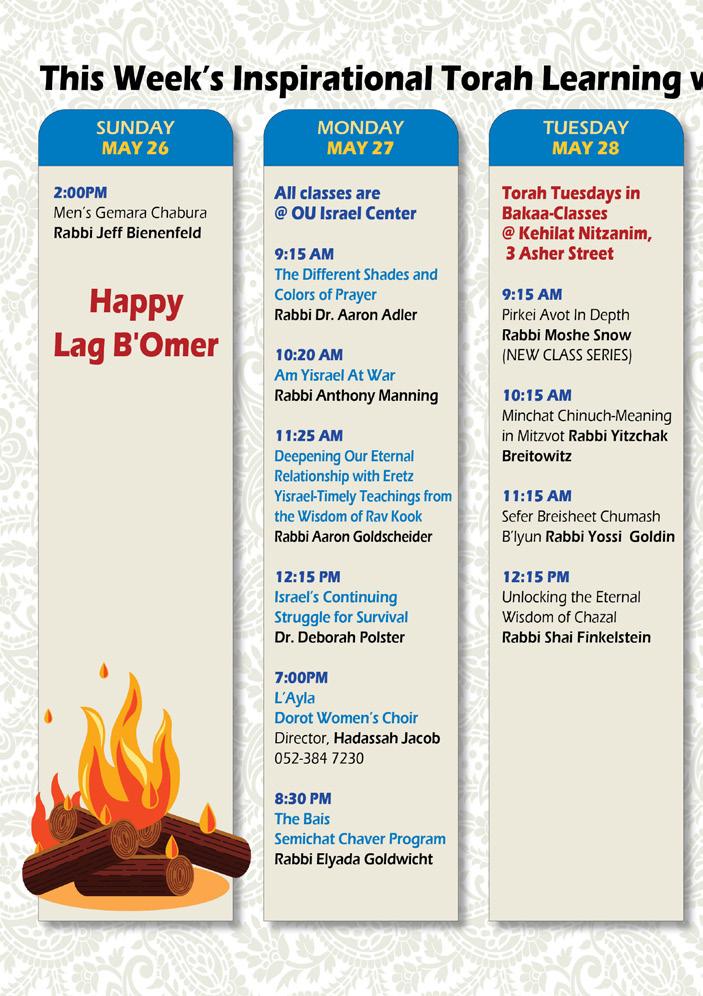
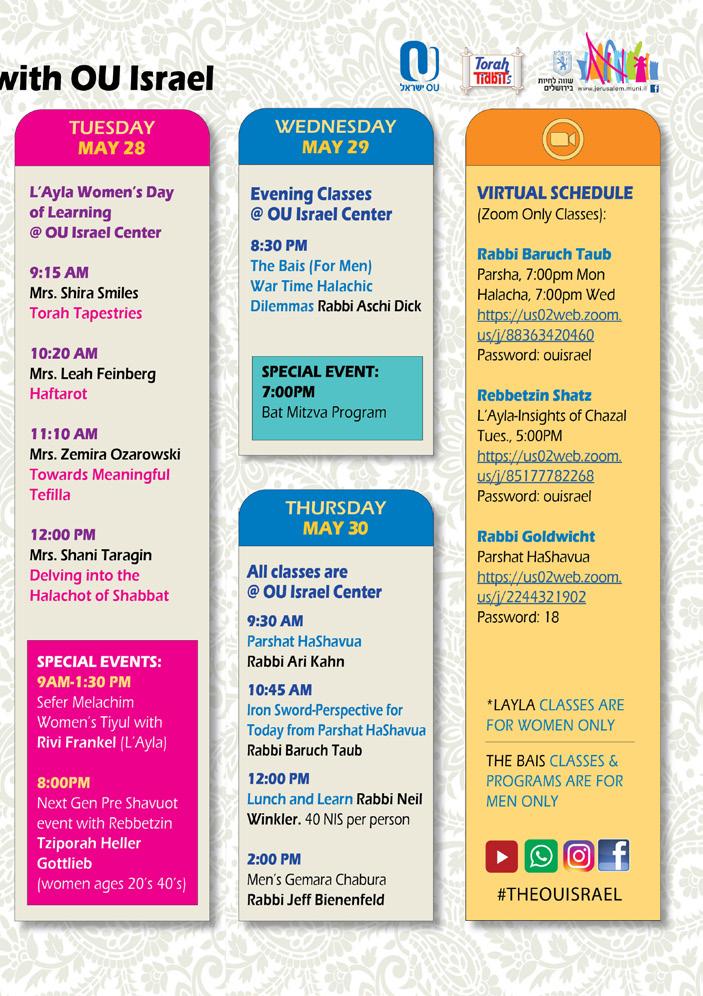

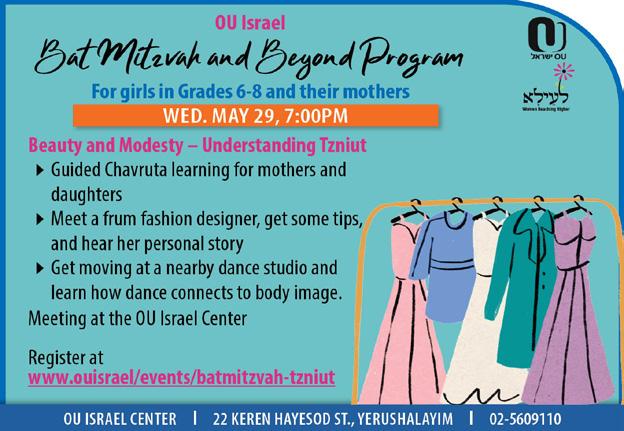

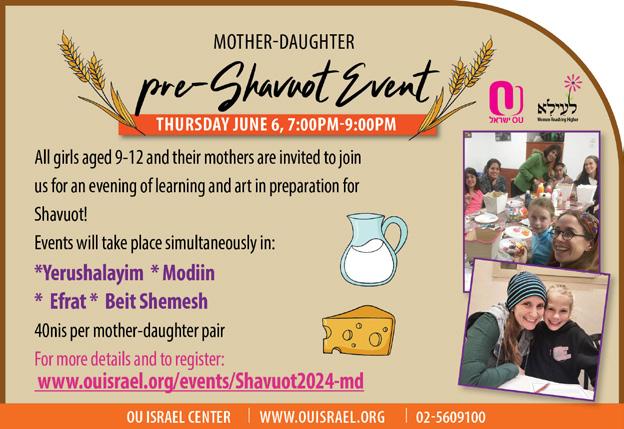

The OU’s Jewish Learning Initiative on Campus (JLIC) is creating and nurturing vibrant religious communities in Israel to support English-speaking college students and young professionals.
JLIC Israel’s goals include: building a warm and welcoming Jewish community for students and young professionals; providing engaging and dynamic Jewish education; providing a supportive home environment for Olim; providing resources for personal and religious growth, including personal mentoring, Aliyah support, religious guidance and leadership development. Current JLIC programs in Israel include: Reichman University - Herzliya; Bar Ilan University - Givat Shmuel; Tel Aviv University; Tel Aviv for Young Professionals; and Jerusalem. Contact: Rabbi Jonathan Shulman, Director of OU-JLIC in Israel shulmanj@ou.org
NCSY in Israel does not just mean summer programs for teens from abroad. NCSY Israel is an NCSY region serving teens living in Israel with events and Shabbatonim throughout the year.
JUNE 17-18, 2024
Tzitzit tying at the OU Israel Center with Ruti - no experience needed Mondays at 1:30pm and Wednesdays at 12:00pm
OU ISRAEL CENTER 91 words. when every as Mount of entire this things connecessence us the because essence. Sinai physical mitzvot matters. that voice, afterlife. I canFor no foland comreal amazing teachreceived us
GET FIT WHILE YOU SIT: Exercise for ladies Sundays 12:45-1:30pm at the OU Israel Center Sura Faecher 0504153239
Resumes Oct 15th 12:30-1:15pm
Audiovisual Presentation: How violent UNRWA Summer Camps since 2009 prepared the way for the October 7, 2023 Explosion
Mondy, June 2, 2pm at the Ou Israel Center Presented by David Bedein
Investigative Film Maker
Apologies For The Technical Inconvenience Of May 8
TO SPONSOR A SHIUR CONTACT
Chana Spivack - 050-229-4951 or donate online: https://www.ouisrael.org/donate/ou-israel-center/
TUESDAY, MAY 14TH
RABBI SHOR’S YOM HAATZMAUT SHIUR given at the Young Israel of Armon HaNatziv was sponsored by Rose Wolfied - in loving memory of her husband Reuven ben Shmuel haLevi Wolfeld z”l, Yahrzeit 6 Iyar. Reuven Wolfeld taught at the OU Israel Center for many years and was a member of the Young Israel of Armon HaNatziv. May his memory be a blessing to all who knew him. ךורב
MONDAY, MAY 20TH
RABBI DR. AARON ADLER’S SHIUR was sponsored by Rosina Fisher for an aliyah of the neshamot of her husband Mordechai Avigdor ben Peretz z”l and her parents Chia Esther bat Yerachmiel Yissachar HaCohen a”h & Yitzchak ben Yehuda z”l May their memories be for a blessing
RABBI SNOW’S SHIUR is generously sponsored for this academic year by Scott & Linda Haniford.
RABBI SHAI FINKELSTEIN'S SHIUR
Sponsored for this academic year by the Sondhelm and Wertenteil families in memory of Mel David z"l
RABBI ADLER’S SHIUR
Sponsored for this academic year by the Frist family in memory of their beloved daughter and sister Elisheva Frist a"h
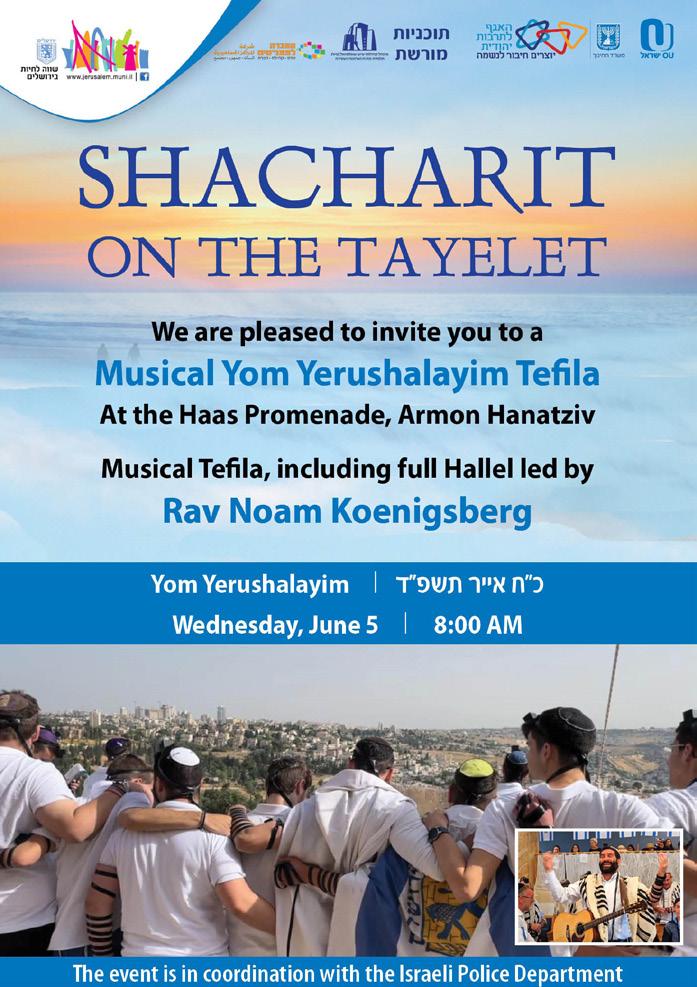
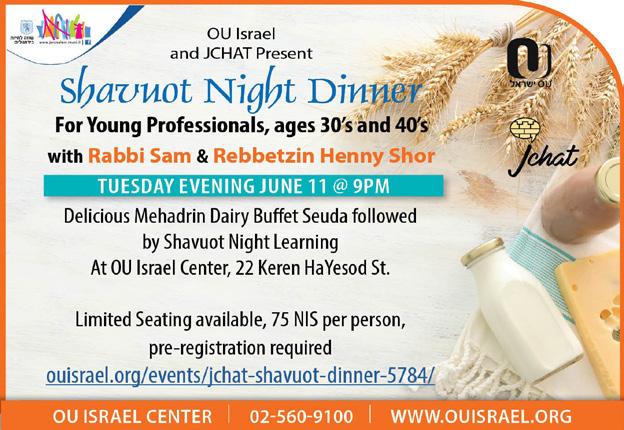
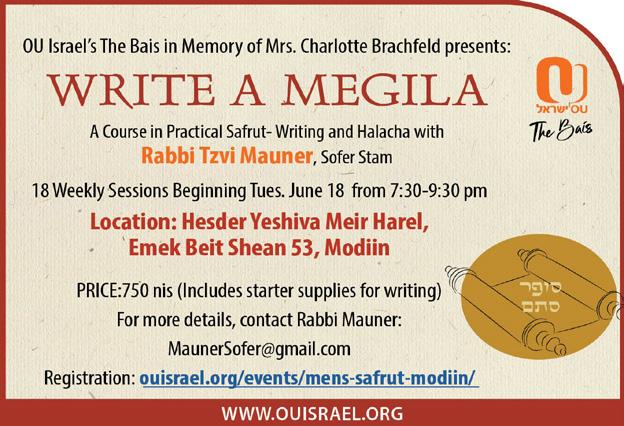
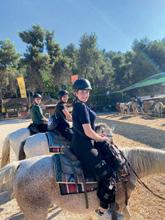





•Dates: July 9-25, 2024
•Location: Yad Binyamin
•Director: Emily Stemp

•Dates: July 9-28, 2024
•Location: Bet Meir (NCSY Kollel Campus)
ector: Rabbi Yosef Ginsb

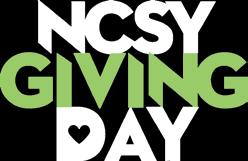

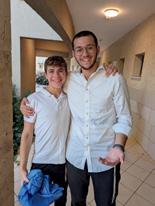

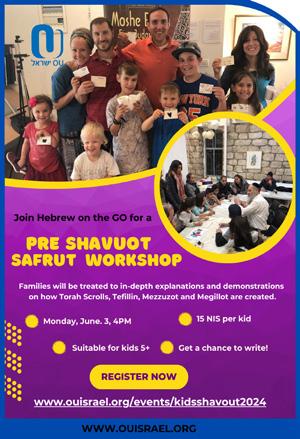











Originally, the Omer period served as a countdown between Pesach and Shavuot. Each of these festive chagim is marked by a distinctive korban offered from the new harvest: Pesach is highlighted by the omer korban from fresh barley while Shavuot in the Mikdash is centered upon the shtei Halechem breads baked from fresh wheat. Bookended by Pesach and Shavuot, the period of the Omer indexes the interval between these two colorful korbanot.
In addition to clocking the interval between korbanot, the counting process augmented our anticipation and preparation for Matan Torah. It was a period of joy, expectation, and heightened religious consciousness.
OMER
Throughout our tortured history in galus this joyous period turned dark. About two thousand years ago, Rebbe Akiva lost 24,000 of his talmidim to a lethal pandemic. Some claim that they were soldier-scholars who were brutally killed during the Bar Kochba rebellion while defending our quickly dissolving sovereignty.
Whether they died in a pandemic or were killed by Roman swords, their deaths occurred during a very depressing period of
Jewish history. We had just lost the Mikdash and were beleaguered by unrelenting and punishing Roman persecution. Watching our best and brightest Torah scholars suddenly vanish further demoralized our already deflated national spirit. The joyous Omer period became bleak.
About a thousand years later this period, once again, turned ominous. In the late 11th century, the Crusaders tore through the Rhineland en route to Yerushalayim viciously murdering and brutalizing innocent Jewish communities. This barbaric attack signaled the beginning of institutionalized Christian antisemitism which would leave a sad legacy of hatred and a trail of blood through the ensuing millennia.
Based upon these two tragedies, the Omer became a period of mourning. Though we mourn these two particular events, in reality, we mourn the entire 2000-year exile which was punctuated by these two traumas. During the original era of Jewish sovereignty, the Omer was celebratory and anticipatory. As Jewish history shifted into exile this same period became tragic and sorrowful. The Omer is a mirror of Jewish history.
THE RENAISSANCE
In the modern era, the Omer period has
undergone partial reconstruction. Jewish history is fluid and dynamic. Just like the Omer changed in exile, it also has transformed as we inch our way closer to redemption. Two major milestones on the road to full Jewish sovereignty occurred during this once catastrophic period. In 1948, our sovereign State was declared at the beginning of Iyar. In 1967 our return to Yerushalayim and to the Biblical corridor of Israel occurred during the tail end of Iyar. The Omer season has begun to morph from a period of unmitigated disaster into a period of joy and triumph. Though we must not discard minhagim and we cannot suspend the mourning elements of the Omer, we must also celebrate the overhaul of history and the resuscitation of this period. The Omer is a mirror of Jewish history.
Though the Omer has undergone historical transformations, it is also a roadmap to a realm which lies beyond history and beyond human affairs. The arithmetic structure of the Omer counting closely resembles the substructure of the upper worlds which kabbalah maps, known as supernal olamot elyonim. These realms are structured upon a lattice of “features” which reflect elements of the divine essence. These microcosmic “emanations” of divine features are referred to as “sefirot” and are the attributes by which Hashem administers to His cosmos.
Though the respective lattices of each of the supernal realms is assembled with 10 sefirot, these 10 further subdivide into 3 “upper sefirot” and 7 “lower sefirot” known to us as: chesed, gevurah, tiferet, netzach, hod, yesod, and malchut.
These 7 lower features of the upper worlds are woven into the seven weeks and seven
Exclusive Apartment 176 SQM on whole 3thd floor
5 bedrooms 3 bathrooms big kitchen
Small building only 5 religious families
Shabbat elevator sukkah balcony ( 10 SQM )
Central and quiet area close to park
5.800.000 NIS
Baruch 0522534078

days of Sefirat Ha’Omer. Kabbalah asserts that counting the Omer is both inspired by, but also impacts these 7 sefirot of the upper worlds. For this reason, even people who don’t typically practice or even contemplate kabbalah, allude to these sefirot while counting the Omer, by associating each day with a different combination of sefirot. Additionally, many conclude their counting with a kabbalah-inspired tefillah requesting that our personal counting repair upper worlds.
In addition to the mathematical parallels between the Omer and the upper worlds, this is a different association between the Omer and kabbalah. Rebbe Shimon bar Yochai, the author of the Zohar, the major work of kabbalah, passed away on Lag Ba’omer. His yahrzeit on this distinctive day of the Omer further cements the influence of kabbalah upon the Omer.
The Omer then, is a period of historical resonance, but also a period to ponder the metaphysical realities which hover above our terrestrial realm. Though these kabbalistic echoes are relevant every year they are even more crucial during our current Omer, as we continue our struggle and our war. During this difficult year, kabbalistic thoughts are even more essential.
First a definition. Kabbalah is often mistranslated into as Jewish mysticism, which implies a nonrational experience. In reality, the study of kabbalah is extremely rational and was adopted by most of the great Jewish thinkers. Though analysis of kabbalah is logical, it isn’t empirical. Science and logic can only detect elements of our world. By contrast, kabbalah depicts upper worlds which aren’t part of our own universe, but still impact our universe. As these details can’t be discerned empirically, they can’t be “proven” and must be accepted as delivered or inherited truths. Hence the term kabbalah or “received ideas”. Once these truths are delivered, they can be studied and evaluated through rational analyses. There is nothing “mystical” or irrational about the study of kabbalah. A better translation for kabbalah would be the cosmology or the study of the broader cosmos which Hashem created beyond our own small and limited universe. By pondering the realms of the cosmos which lie beyond and above our own, we realize that there are larger forces which shape history. When events in our own world are puzzling and depressing, it is helpful to remember that these larger forces are built into Hashem’s creation. There are preprogrammed conclusions to history which may
not always be evident in human affairs.
One of those larger “built-in” forces is redemption. Redemption in kabbalah isn’t limited to the return of a chosen people to their homeland. It isn’t even limited to the spiritual restoration of humanity. Redemption is the comprehensive reunification of a divided world into one indivisible entity reflecting, in part, the indivisibility of the Creator.
Additionally, the cosmos is constantly surging toward an inevitable redemption and restructuring, which will be centered upon the restoration of the Jewish people to their homeland. The inevitability of broader cosmic redemption boosts our confidence during dark and frustrating periods such as our own, when geulah appears to stall or even regress. It may appear to pause in our realm but cycles on, inexorably, in the larger reality.
We are not an escapist culture, and we don’t employ kabbalah as an escape hatch to flee from real-world issues and from real-world struggles. The inevitability of redemption and the acknowledgement of larger forces influencing history doesn’t exempt us from wrestling with hardships on our own planet. However, the inescapability of redemption buoys our spirit against the type of depression and frustration which our war has aroused. During adverse moments of Jewish history kabbalah stresses that our world isn’t the only realm which shapes that history.
Since kabbalah is centered upon the unification of the entire cosmos, it is holistic and integrated. Events and aspects of our own reality which seem unrelated are jointly impacted by upper worlds and are therefore related. Redemption in kabbalistic terms
incorporates every feature of this world and of the human condition even if they seem unrelated to us.
Part of what makes this war so confusing is the cacophony of opposition and hatred which we face. We were brutally attacked by a barbaric group of homicidal maniacs. Not only have these rapists been supported by most of the Arab world but also by hyper-liberal progressives across college campuses and European capitals. Joining this alliance of hate are minority groups who should be supporting the forces of democracy and the culture of life rather than a culture of death and bigotry. Our battle has become entangled with a raging culture war and has also awakened the grotesque monster of antisemitism. The intensity of the protests may forecast a general societal deterioration into violence and anti-establishmentism. The world is spiraling.
Kabbalah stresses that everything is integrated. It should not be surprising that a local battle for our homeland and for our security, has escalated into a struggle for Jewish identity, Jewish survival, and a cultural battle. The integrative nature of kabbalistic thought stretches our imagination, forcing us to think panoramically rather than myopically.

Finally, kabbalah, and the Zohar in particular, highlights the great indefatigable love between Hashem and His chosen people. This is why kabbalah resonated so deeply during periods of crisis, such as after the destruction of the second Mikdash, the 16th century period after the horrific Spanish inquisition, and in the gloomy aftermath of the Khmelnitsky massacres of the late 17th century. Amidst gloomy periods of tragedy and hester panim, kabbalah restored our faith in an ancient love which history cannot conquer.
During the past 7 months of hester panim it has sometimes been difficult to detect the loving hand of Hashem’s hashgachah. The kabbalistic resonance of the omer reminds us that, despite the confusion and despite our many questions, Hashem’s love hasn’t expired, and we are still His children.
Rabbi Taragin’s new book about the war in Israel ‘Dark Clouds Above, Faith Below’ is now available in bookstores, or at:
https://www.amazon.com/dp/ B0CZ7N8ZJB or: https://kodeshpress.com/product/ dark-clouds-above-faith-below/


The Haftorah opens to a dark period, Yerushalayim under siege by Bavel, and the future bleak. In the midst of this turmoil, the Navi Yirmiyahu finds himself imprisoned by King Zedekiah for prophesying the destruction of Jerusalem. It is in this setting of despair and hopelessness that Yirmiyahu receives a Divine instruction that seems utterly illogical: to buy a field in Anatot, a territory already under Babylonian control.
Yirmiyahu follows G-d’s command and purchases the field. Holding the contract in front of a group in the prison, he directs them by the command of Hashem to put the documents in an earthen jar to preserve the moment and the message of an unshakeable faith in the future redemption and the unbreakable connection between the Jewish people and their land.
For thus said G-d of Hosts, the G-d of Israel: “Houses, fields, and vineyards shall again be purchased in this Land.”
Despite fulfilling the Divine directive, Yirmiyahu struggles to understand the Divine message in the overwhelmingly gloomy time. In a profoundly intimate moment, he confronts Hashem
to understand how Jewish history can speak of Divine love and goodness, while he is witness to profound pain and imminent destruction, the result of sin and denial of Hashem’s reign.
The Malbim offers a poignant interpretation of the concluding pasuk of the Haftorah. He explains that Hashem is reminding Yirmiyahu— and through him, all of us—that human limitations do not apply to the Divine. The redemption and the future of the Jewish people and their Land are not bound by the present reality. The Malbim emphasizes that Hashem’s covenant with the Jewish people is eternal and unbreakable, transcending any temporal hardships.
The purchase of the field serves as a tangible expression of this sacred promise. It is a symbolic act that affirms faith in the continuity and resilience of the Jewish people, despite the current siege and impending exile. The act of buying the land is not just a statement of hope; it is a declaration of trust in G-d’s ultimate plan for redemption.
In our own lives, we often face moments that seem insurmountable, where the future appears grim and uncertain. The Haftarah reminds us that even in these moments, we must hold onto our faith and trust in G-d’s greater plan. The bond between the Jewish people and the Land of Israel is eternal, rooted in Hashem’s promise and purpose. Let us remember in these very challenging times that no matter how dire the circumstances, nothing is too difficult for Him. Our connection to the Land of Israel, and indeed to our own faith and heritage, is eternal and unbreakable.

• Highest class boutique buildings with only 1 or 2 apartments per floor
• Five star hotel facilities including pool, spa, gym, concierge, synagogue, numerous dining options, maid service, 24/7 security and more
• Ideal location where Talbieh, Old Katamon and German Colony meet.
• Walking distance to Great Synagogue, Old City, Emek Refaim and First Station.
• Private land- Tabu
• Including 2 secure covered parking spots + private storage room.
• Prices starting at 15.7 m Shekels for exquisitely finished 182.5sqm apartment with 27sqm South-facing terrace with sunrise to sunset views over the pine trees of the landmarked ‘Moon Grove’



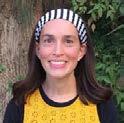

ven though we already concluded our study of Birchat HaMazon in the last article, I recently came across a remarkable story about bentching that I thought would be important to share with you. The story illustrates a beautiful point brought down by the Sefer HaChinuch. The Sefer HaChinuch writes –
Now that Shabbat afternoons have gotten longer, there’s suddenly time for everything – sleeping, learning, and taking the kids to the park. Are these activities simply enjoyable things that we like to do over Shabbat or are there sources indicating that we are actually required to do these activities on Shabbat?
Anyone who is careful with their Bentching, his livelihood will be provide for him with respect all of his days
The Talmud Yerushalmi states as follows - “In what way might a person fulfill the Mitzvah of Oneg Shabbat (enjoying Shabbat)? One opinion says - through sleep, and one opinion says - through studying Torah. These opinions do not disagree- one answer relates to a scholar, and one answer relates to a lay person.”
Most assume that this Gemara means everyone should do whatever they enjoy the most. A Talmid Chacham who loves to learn should spend his time learning and a lay person who prefers to relax and sleep, should do so. The Meiri however says
We spent a lot of time in our Birchat Hamazon series discussing the meaning and significance of all of the Brachot of the Bentching. But beyond understanding the deeper meanings, we also need to make sure to be ריהז with our bentching, to be careful how we recite the Bentching, the respect we give to it, and the way we concentrate and focus. If we do our bentching right, we are told that Hashem will reward us with a good livelihood.
This story is told by Rabbi Yoel Gold and has a profound message for us in our own

Two years ago, after the tragedy in Meron, a man named Chaim Ginz decided to try and be as many of the victims’ families as possible. The first family he visited was the Zacbach family in Bnei Brak, who were mourning their 24 year old son, Menachem Asher. At the shiva house, the family gave out The last will/
the opposite - The Talmid Chacham who learns every day of the week fulfills his Oneg Shabbat through sleep, so that his mind will not be too fatigued. A lay person, who is busy during the week with business and other dealings, should try to fulfill his Oneg Shabbat through learning Torah (which he doesn’t get to do as much during the week).
The Rama (OC 292:2) actually poskens that way – Businessmen should spend more time on Shabbat learning Torah, and Talmidei Chachamim should spend more time with the physical pleasures of Shabbat. Either way, we see that there is room for both as part of our fulfillment of Oneg Shabbat.
The Mishna Berura (OC 290:5) explains that one of the reasons why it is so important to learn Torah on Shabbat is based on a Midrash which says as follows -
request (האווצ) of Menachem Asher is to bentch out of a bentcher”. The family explained that at the age of 16, Menachem Asher had taken on the practice of always bentching from a bentcher and never reciting the bentching by heart. He took this commitment very seriously and would never wash and eat bread unless he was absolutely sure there was a bentcher available in the vicinity. Chaim Ginz heard this and decided to take on this practice as well, l’iluy nishmat this young man. About a month later, Chaim was feeling pretty stuck. He was having trouble making a living. He was a Sofer and he had just completed a project and was unable to find any more work. Day after day, he would show prospective clients samples of his work but they just kept turning him away. He was feeling very rejected and depressed. One day, he was in a special apartment in Bnei Brak which sofrim use as a place to do their work. He had something to eat and was ready to bentch. He didn’t have a bentcher on him so he was about to bentch by heart. But he remembered his commitment and began to search the apartment from top to bottom. Finally, after many minutes, he located a bentcher hidden under a stack of papers on the top of a bookshelf. He noticed that the bentcher was written in תירושא
The Torah said to Hashem – When Bnei Yisrael come into Israel, they are going to get very busy tending to the field and then what will be with me? Hashem answers – I have a partner with whom I will pair you and its name is Shabbat. During Shabbat, the people stop working and have the opportunity to spend their time learning.
, the font used by sofrim. He admired the beauty of the writing and after bentching, he decided to use the bentcher to help him with his own writing. For three hours, he
The Piskei Teshuvot (OC 290:5) adds that on Shabbat, we all receive an extra Neshama. This Neshama grants a person יקולא עפש (Divine outpouring) and more לכֶש (intellect), enabling him to learn Torah on a much higher level. He writes –
should sleep away a large portion of Shabbat, as that will make him unable to use the rest of his time for Torah study.
The achievements of learning Torah on Shabbat are a thousand times greater than the achievements of learning Torah during the weekdays.
Additionally, the Pninei Halacha (Shabbat 5:1) quotes a midrash in Tana d’bei Eliyahu Rabbah that Hashem said to Bnei Yisrael –I commanded you הלילו
תיגהו that you should study the Torah day and night. Since you are busy working for six days a week and are not always able to fulfill this command, at the very least please dedicate Shabbat to Torah study.
Aside from Torah study, we saw that the Yerushalmi also mentions sleeping as a worthy form of Oneg Shabbat. The Rama (OC 290:1) writes that if one is used to sleeping on Shabbat, he should continue this practice as this is his form of Oneg Shabbat. The Mishna Berura (290:3) clarifies that the Rama’s position does not mean that someone

Interestingly, Rav Chaim Volohzin writes that when a person is awake, his Torah knowledge is limited by the confines of the physical body. But when he is sleeping, his Neshama is unconstrained by the physical and a deeper level of Torah is revealed. Perhaps this is an additional incentive to take a Shabbat nap!
Needless to say, spending time with one’s children on Shabbat, whether at the park, playing board games, or learning b’chavruta, is an extremely important and valuable form of Oneg Shabbat.
Trying to fit learning, sleeping, and family time into one Shabbat afternoon can sometimes be tricky, but all are important and vital parts of the Shabbat experience.
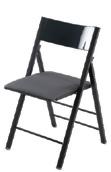

Two principal cycles are the focus of Parashat Behar. The small cycle repeats every seven years with shemitah (the Sabbatical year); the larger cycle recurs every fifty years, after seven shemitah cycles, with yovel (the Jubilee). In both years it is forbidden to work the land (Leviticus 25:4-5,11), but yovel possesses features absent from shemitah. During yovel, ancestral land reverts to its rightful owner and slaves are freed (Leviticus 25:10).
We are accustomed to refer to the Sabbatical year as shemitah, yet that word does not appear even once in Parashat Behar. In its place we find the word shabbat, usually used to refer to the weekly Shabbat, and no less than seven times at that. The Torah is indicating that Shabbat, which comes every seventh day, and shemitah, which recurs every seventh year, share similarities. Rav Avraham Yitzchak Hakohen Kook wrote that the description of shemitah as Shabbat conveys a profound affinity in their goals and effects:
Life can only be perfected through the affording of a breathing space from the bustle of everyday life. The individual recovers from the influence of the mundane at frequent intervals, every Shabbat.... What Shabbat achieves regarding the individual, shemitah achieves with regard to the nation
as a whole. 1
In the same way Shabbat provides rest and revitalization for the individual, shemitah does the same for the entire nation.
What exactly is the role of yovel, then, coming after seven shemitah cycles? We note that the Torah does not command us to count the fiftieth year but the seven preceding cycles:
“You shall count for yourself seven cycles of Sabbatical years, seven years seven times; the years of the seven cycles of Sabbatical years shall be for you forty-nine years” (Leviticus 25:8). Only after counting seven cycles of seven years can we sanctify the fiftieth year. Rav Kook explained that Sabbatical cycles are a gradual, winding ascent towards the yovel, which is only reached once the count is complete.
...the yovel emanates a spiritual power which progressively gains momentum until it is possessed of sufficient vitality not only to tap the existing good stored in the life of the nation and preserve the character of life according to the pattern of shemitah, but also to remedy the distortions and faults of the past, restoring national life to its original conception and its pristine freshness…2
Yovel commences with the sounding of the shofar on Yom Kippur (Leviticus 25:9). As such, one can say that if shemitah is the Shabbat of the nation, yovel is its Yom Kippur. Just as the individual faces his true self
1. Introduction to Shabbat ha-Aretz quoted by Leibowitz, Studies in Vayikra, 521.
2. Ibid., 261.
on Yom Kippur, the Jewish people reorients itself back to its ideal state during yovel. One manifestation of this is the giving of land back to its original owner. This reinstates the original, divinely mandated apportionment of our nation throughout the land. On yovel, every Jew comes back to their roots, every family in their ancestral home.
The ability to revert to how things once were requires a kind of nationwide liberation that only God could envision and require us to implement. The land is disencumbered of all its accumulated financial and societal bonds fastening it to this or that individual. Slaves, even those who wish to stay with their masters, must be manumitted willy-nilly. Indeed, according to the Ramban, Scripture chose to call this year yovel (לבוי) on account of the freedom it brings, because “during it every person is led back (לבוי) to his inheritance and family.” 3
For Rav Kook, freedom is something every human being—and not just slaves—can experience and appreciate. We are enslaved and subservient to pressures within us and those in society, to unbecoming urges and unsavory influences. In his own words:
“The difference between the slave and the free man is not merely one of social position. We can find an enlightened slave whose spirit is free, and, on the other hand, a free man with the mentality of a slave. Intrinsic freedom is that uplifted spirit by which man—as well as the nation as a whole—is inspired to remain faithful to his inner essence, to the spiritual attribute of the divine image within him; it is that attribute which enables him to feel that his life has purpose and value.”4
Every Yom Kippur, the individual Jew
3. Ramban on Leviticus 25:10.
4. Jaffe, Celebration of the Soul, 142.
repents and rights himself according to the image of the person he ought to be. This is an act of self-purification helped along by God: “from all your sins before the Lord shall you be purified” (Leviticus 16:30). On yovel, the whole nation is spurred towards achieving the highest degree of purity by removing the heavy self- and other-imposed shackles of wealth-seeking and cutthroat competitiveness. With the emotional and psychological bonds that hinder and impede growth broken, the Jewish people can soar.
Yovel occurs every fifty years. The number fifty in Jewish thought symbolizes the highest achievement possible. For example, the Talmud says that there are fifty gates or levels of comprehension.5 Attaining the highest level is nearly impossible, but this must not deter us. For forty-nine years we live by the dictum that although we are not required to complete the work, neither are we free to desist from it.6 The best possible version of ourselves is within reach.
5. Rosh ha-Shanah 21b.
6. See Pirkei Avot, 2:21.
Rabbi Goldscheider is the author of the newly published book ‘Torah United’ (OU Press), featuring divrei Torah on the weekly parasha from Rav Kook, Rabbi Solovetichik, and the Chassidic Masters.


Question: Summary after follow-up questions: The apartment we are moving into has an open balcony (mirpeset), accessed only by our living room, whose main functions are “taking in” the air, sun, and view, and presumably for kids to play. (It is not for a sukkah because most of it is covered by a neighbor’s mirpeset.) Its dimensions are 4.3 meters X 1.2 meters. Does it require a mezuzah and if so, on which side?
Answer: The first question, whether the mirpeset requires a mezuzah in its own right, has two parts. The gemara (Yoma 11b) derives that only “houses made for living” require a mezuzah. There are different indications as to whether what Chazal called mirpeset requires (see ibid. and Menachot 33b), and the Shulchan Aruch (Yoreh Deah 286:7) rules that it depends if there is an entrance from a house to the mirpeset. However, that is not talking about a balcony. Most poskim posit that our mirpesot require mezuzot (see Chovat Hadar 2:5) because stepping out for air etc. is a normal way of using one’s house. Although a house needs a roof to require a mezuzah (Shulchan Aruch ibid. 14), it is normal for
RAV DANIEL MANNa balcony to not have a (full) roof, and lack of one does not necessarily exempt (see Sha’arei Hamezuza 2:(11)). According to some opinions, and possibly depending on certain parameters, one would affix the mezuzah to a mirpeset without a beracha (see ibid. (12)).
The balcony’s size is an important factor. The minimum size for a house is 4 amot (around 2 meters or a little more) by 4 amot, regarding several halachot including mezuzah (Sukka 3a). The Rosh (ibid. 16) posits that both its length and width must be 4 amot. Most early sources understand the Rambam (ibid. 2) as saying that it suffices that the room’s area be 16 sq. amot, even if one of its dimensions is less than 4 amot, and the Shach (286:23) treats the matter as a doubt. According to these rules, there is a doubt whether your mirpeset (around 20 sq. amot, but not 4 amot wide) is big enough to require a mezuzah. The Pitchei Teshuva (YD 286:11) cites an opinion that a room whose size is viable for its living purposes requires a mezuzah even if it is “undersized.” While this is a respected opinion (see Minchat Yitzchak I:8), it is unclear to what extent we accept it (see Chovat Hadar 4:(16)).
The indications are, then, that there is a doubt whether your balcony deserves, from “its sake,” a mezuzah, and in which case, affixing it on the right going out without a beracha on it could make sense. However, even according to the possibility that the mirpeset does not have its own mezuzah obligation, its connection to the living room
Eretz Hemdah, the Institute for Advanced Jewish Studies, Jerusalem, is headed by Rav Yosef Carmel and Rav Moshe Ehrenreich, founded by Rav Shaul Yisraeli, zt”l, to prepare rabbanim and dayanim to serve the National Religious community in the Israel and abroad. Ask the Rabbi is a joint venture of the OU, Eretz Hemdah, and OU Israel’s Torah Tidbits.

may affect matters.
We put the mezuzah on the right side going into a house, but when going from room A to room B within it, we must decide which room we are considered entering from which, to determine which side is “the right.” The major factors are: 1) which room is used more significantly; 2) into which room does the door open; 3) most importantly, when one can only enter room B by means of room A, we view it that we are going into the “dead end” (Taz, YD 289:4; Pitchei Shearim 289:67).
Your mirpeset is such a dead end, ostensibly indicating to affix the mezuzah on the right side going out to the balcony. (A minority opinion holds that since the mirpeset is subservient to the house, one always puts it in the direction of entering the main house (Chazon Ish, YD 168:5).)
However, if the mirpeset does not deserve a mezuzah, it may enable the following possibility. Just like an entrance from a non-mezuzah-entity into a house requires a mezuzah, so does a non-mezuzah-entity mirpeset need one going into the house. Then, you would need a mezuzah going into the house, on the right side (see R. Akiva Eiger to YD 186:13).
In summation, there are many indications in different directions. We would be tempted to suggest a mezuzah on each side, but we must not do that (see our column, Kedoshim 5774). We recommend affixing it on the right coming into the living room, doing so along with a mezuzah for a definitely required location, so one can “share” the berachot.

For a Din Torah in English or Hebrew contact:
Eretz Hemdah - Gazit
Rabbinical Court
077-215-8-215 • Fax: (02) 537-9626
beitdin@eretzhemdah.org
www.angelrealty.co.il
For Sale in Efrat
Dekel: * 340m Semi attached home, 11 rooms + rental unit. Great location 5,900,000 NIS
Dagan: * 6 room garden duplex. Huge 300m garden 3,600,000 NIS
Tamar: * Semi attached home - 8 rooms. 4.5 million
Zayit: * 4 room apt. (near Olive) 2,670,000 NIS
Neve Daniel: * 5 room garden duplex. 2,870,000 NIS
For Sale in Ramot B
7 room, stunning semi attached home. Great gard en. 6.5 million
Gabi- 0524588716

Before Pesach we started discussing the possibility of supervising fertility treatments using a camera that filmed the procedures and ensured constant surveillance of the embryologist’s work.
The Torah (Devarim 19:15) states that testimony must be given by the “mouths” of two or three witnesses. The Gemara (Gittin 71a) deduces that the “mouths” comes to exclude any other form of witnessing, “from their mouths and not from their writing”, in the words of the Talmud. Testimony of witnesses must be in a direct form; they must see directly and report directly.
But we can claim that the direct seeing of the event being witnessed, in our case, the fertilization of the specific egg, must be seen “live”. There is a distinct difference between seeing a recording of an event that happened sometime in the past, as opposed to seeing an event in real-time. For example, what would be the case if witnesses saw the event in a mirror? On the one hand, they saw exactly what happened as it happened, and they can legitimately appear before the Beit Din and relay what they saw. On the other hand, this is not direct seeing, but seeing through a medium and can be claimed to be disqualified in halachic terms.
If a witness saw the new moon reflected in
water they can appear before the Beit Din in Jerusalem and claim that they saw the moon, even though they did not see it directly. This would suggest that indirect viewing can be considered “seeing” even in the case of a Torah obligation to see.
However, there are poskim who are of the opinion that the Torah had no intention that we use modern technology to fulfill Torah obligations. We need not use modern measuring instruments to ensure that our tefillin are perfectly square, nor can we disqualify tefillin that appear to the naked eye to be square, but when measured by calipers are found to be not a perfect square.
If this is the case, witnessing an event by watching a screen would not be considered “seeing” in halachic terms and such witnessing would be invalid.
While this is not the accepted halachic position it is clear that there are cases in which seeing must be direct and not through a technological medium. There is a blessing to be made when seeing a monarch. If one sees the king live on television they cannot make the bracha, even though they are clearly “seeing” the king.
So must “seeing” be direct or can it be performed through a camera?
More on this next time.
Mazal Tov to Hannah & Menachem Katten and family on the birth of a grandson
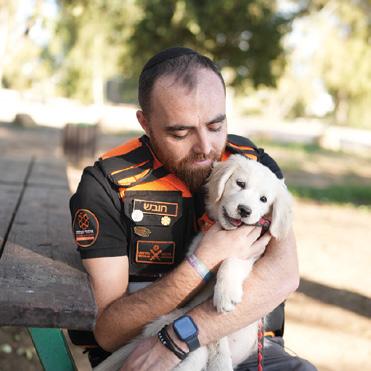




many parents face is figuring successfully adapt their relationship a younger child into an adult relationship with an adult child.
As parents, we often think that as time goes on, our acquired experience ought to make parenting simpler. But what many parents find is that as their child gets older, the challenges of parenting become more complex. One aspect of this complexity that many parents raise is the shifting relationship with their child as the child grows through adolescence into early adulthood. During this time, the child is clearly going through an array of transitions, both externally and internally. As a result, the relationship between the child and his parents is changing, and parents may struggle as they navigate this shift.
Following the recent string of terrorist attacks, my son, 11, has become very anxious. I, of course, have also been affected by all the loss and trauma. I’m not sure how much or how little to share with him in general and specifically regarding my own emotional experience. For example, should I try not to cry and be sad around him? T.R.

The recent protests and encampments on American college campuses have many people asking “Where are these kids’ parents?” This question brought into focus a debate about parenting that has developed over the past 50-plus years in the Western world about the parents’ role in providing moral guidance and instruction to their children. Although the Torah view in this debate may seem obvious, it is worth reflecting on this issue.
Michal Silverstein, MS Dear T.R.
Thank you for asking this very relevant and timely question.
One reason this transition confusing is that the duration to adulthood, for many people, form and may stretch over many The traditional Western value, it was never reality for many that a person turns 18 and becomes responsible for himself. He starts some money, lives on his own, pays way, and looks to get married, short order. All of these lifecycle would indicate that the child has an adult.
when responding to children under these circumstances.
Firstly, it’s important to give children a safe space to speak, meaning a space to express them selves in the way that is natural for them. Some children don’t have much of a reaction and others will cry, show anger and frustration. They may say things that you don’t agree with or challenge you. Giving them the space to do this is crucial.
One side of this debate suggests that a parent’s role is to provide a foundation from which the child discovers his own set of values and moral compass. In this view, a parent should be cautious not to interfere with the child finding his own way. The opposing view argues that parents should have a central role in imbuing the child with values. Proponents of this position argue that providing this type of guidance is among a parent’s most important responsibilities to his child. I believe that the Torah supports the latter position.
responsible for the child’s future self, meaning that the parent needs to ensure that the child has the training and skills necessary to function as an adult. This aspect of parenting includes providing an education in Torah, tefillah, and performance of mitzvot, as well as guidance for how to make friends, raise a family, earn a living, and any number of other life skills. A third responsibility of a parent is, to the best of the parent’s ability, to prevent his child from becoming a nuisance to society. This final responsibility can be understood from various passages in the Torah and Chazal. For example, regarding a ben sorer u’moreh, whose trajectory in life is toward becoming a thief and murderer, the verses (Devarim 21:18-19) demonstrate that the parents have a central role in trying to prevent such an outcome.
Most parents understand that for a younger child, instruction, guidance, and oversight are intrinsic to their roles as parents. Parents also know that just because they utter “Baruch she’petarani“ that does not mean the end of their responsibilities toward their child. However, most parents recognize that at a certain point, their child becomes an adult, and as such, he is now responsible for himself and his own decisions. Ideally, the child and his parents form what we might call an “adult relationship.” The challenge that
Adults as well as children are overwhelmed with emotions when they hear about a terrorist attack. When they become more frequent, the feeling of uncertainty and loss of control can create much anxiety. There are certain guidelines to keep in mind

For Sale:
25 Ben Maimon, 4 rooms, 113m, 2 bathrooms, porch, 1st floor, elevator, 6.2 million NIS
Smadar 050-3114040 // 02-642-4329 smadi_bida@walla.co.il
A parent’s role in his child’s life includes several layers of responsibility. First, a parent is responsible to ensure the child has his daily needs provided for, both in terms of his physical needs and in ensuring the child can fulfill his daily functions. A parent is also
Next, when they ask questions, try to give them accurate information, answering only the questions they ask. Stay focused. It’s not necessary to elaborate or get sidetracked by politics or other similar situations. Explanations should be given in an age appropriate manner. Just like your rules are age appropriate your discussions should be as well. Having more detailed, graphic conversations is more appropriate with an 18 than a 10 year old.
It’s important to keep an eye out for both emotional and physical signs of distress. If your child looks sad, has crying spells, becomes fearful or angry or is experiencing changes in sleeping and eating patterns, he may need extra help processing the current state of events. Be aware of behavioral changes.
Another example comes from the first Rashi in Parashat Emor, which addresses the question of why the Torah uses the term “say” twice regarding the command to kohanim to avoid becoming ritually impure. Citing the gemara (Yevamot 114a), Rashi explains that the extra word indicates that the adult kohanim are obligated to caution the kohen youth about the laws of ritual impurity. This is one of the sources in the Torah warning against giving children something that is forbidden to them.
Regarding your own emotional state, it’s important to model emotions in front of your children. Seeing you express your feelings will allow your child to do the same. That being said, there is also a limit. You do not
But in today’s world, and especially frum communities, the markers hood are far less clear. Young typically not able to pay their own to some combination of advanced study, attending college or university, a higher cost of living. There emphasis on marriage, such men and women marry and have years before they are able to support their young family. This cated reality can make it difficult out the contours of an adult relationship between parents and their child.
Although this is not the plain meaning of the verse or related drashot, one can imagine the potential havoc that a ritually impure kohen child presents. Anywhere the child
The slow march toward independence means that there are not clear cations for where the child exists
goes, he can defile his family’s or community’s food; he may inadvertently bring tum’ah into the Beit HaMikdash; or he may make his family members impure, thus restricting their ability to function as a kohen.
The centrality of training our children goes back to the beginning of our nation, as Hashem declares (Bereishit 18:19) that He chose Avraham “that he may instruct his children and his posterity to keep the way of Hashem by doing what is just and right…” This verse directly addresses the debate mentioned above: it is the Jewish parent’s role to do his best to ensure that his children will follow Hashem and know what is just and right. This knowledge cannot be left to chance, nor can we expect other possible influences to help a child achieve those goals. We, as parents, have the unique opportunity
descendants
and responsibility to fulfill this charge from Hashem to Avraham and his descendants. Of course, a parent is not in complete control of his child’s public behavior, but these and other Torah sources point to a responsibility to raise the child in a way that promotes prosocial behavior. The events of recent weeks on American college campuses provide inspiration to renew our commitment to guide our children in what is just and right, and we pray that our children receive these lessons.
When Avraham addresses the people of Cheit, trying to “Ger V’Toshav Anochi Eimachem” (23:4) “A Stranger and This seems to be a contradiction. If one is a stranger than is no longer a stranger. What did Avraham mean?
The Magid of Dubno (Jacob ben Wolf Kranz 1741-1804) this tense situation in order to, both, state his truth and be said, on the one hand, “I am a Resident’ due to G-d’s promise need your agreement to purchase a plot. In other words, Avraham “strangers”, while they understood him as saying that “they”
The peace was kept, and Avraham remained true to his Shabbat Shalom
Ethan Eisen is Clinical Director of Mashiv HaRuach, a Thank You, Hashem project supporting soldiers and their families.

12 TORAH TIDBITS 1440 / CHAYEI SARA 5782



Rookie and Heshie: As a shul rabbi and school principal who were determined to help our constituents identify with Israel and feel her joys and sorrows, her elation and pain, we both worked hard to bring programs that would move their hearts and speak to their souls on these special days in the Jewish calendar.
Rookie: At school, to remember the Holocaust, we brought survivors and children of survivors to tell their stories. We lit candles to honor the victims, the survivors, the partisans, the righteous among the nations, the Jewish Allied soldiers, the kiddush Hashem, the burned sacred books and sifrei Torah, the Jewish life that is no more, the children… We created mini museums of artifacts that families had rescued from their loved ones–remnants of tefillin, scraps of concentration camp uniforms, a copy of the blood libel issue of Der Sturmer, a metal bowl or spoon that sustained a loved one….
Music, Yiddish lyrics, so much more.
For Yom HaZikaron, we invited speakers who had lost a loved one; survivors of terror attacks; we screened films from support agencies like One Family that care for widows, orphans, wounded soldiers who had fought in the various wars; witnesses from 1948, 1967, 1973, 1982, and so on; lit Yahrzeit candles for individuals and groups, read biographies of the deceased; sang songs like Anachnu Shneinu Me’oto haKfar, Ma Avarech, Bab el Wad....
For Yom HaAtzmaut, the students created Daglanut, stations that celebrated Israeli food; innovations in technology, agriculture, medicine; world-wide aid to disaster victims; the miraculous aliyot of Jews from Arab countries, Russia, Ethiopia; solutions for fresh drinking water and irrigation; Nobel prize winners. We held Chagigot, choir and Hebrew drama presentations–anything to help the kids feel so proud of Israel’s accomplishments on the world stage. Of course, Tefilot for chayalim, terror victims, to return captives and for the well-being of Medinat Yisrael were the order of the day.
Heshie: The observances of the days had
two elements: special prayers during services and programming for the community.
In our synagogue, the Shoah, the fallen Israeli soldiers and victims of terror were remembered with solemn memorial prayers. A coalition of local synagogues sponsored larger scale events for the public.
At the Yom HaShoah communal event, Holocaust survivors and their descendants dominated the program. Hundreds of memorial candles were lit.
Yom HaZikaron and Yom HaAtzmaut programs were juxtaposed at the end of Memorial Day, with somber prayers followed by maariv and a melodious Hallel (without a bracha). Israeli songs, a relevant speaker, film or collage of videos added to the experience. The program closed with singing HaTikvah, communal singing and dancing. After Shacharit, there was breakfast sponsored by the Miller family.
Being physically distant from Israel was challenging. We played a recording of the siren sounded in Israel with a video of people in Israel standing at attention on Har Herzl to create a proper ambiance. The synagogue building inside and out was adorned with Israeli and American flags, but it was still different from being in Israel.
Rookie and Heshie: The Diaspora has no military cemeteries to drive home the heavy price we pay for independence. Unlike Israel, where these days are truly felt in the street, diaspora residents go about their business. There is no siren that stops the world for 120 seconds, providing a silence that encourages quiet introspection. No radio stations create a constant mood of the day.
Our programs were well received, but being here, in our homeland, it is just
different. Simple people can be articulate speakers, expressing profound appreciation for the miracle of this state, gratitude to those that made the ultimate sacrifice of life or limb, declarations of love for this land and its proud, strong people. Here, the government provides every grave in the military cemeteries with flowers. The streets are filled with those whose grief doesn’t end, whose memories are overflowing with depth of emotion. Yet the flags fly on the cars, on the city streets and highways, the synagogues are decorated, the school children are wise beyond their years. Indeed, it is good to be here in our homeland.
A recent oleh, Heshie Billet is Rabbi emeritus of the Young Israel of Woodmere and a past President of the Rabbinical Council of America. A recent olah, Rookie Billet retired from a long career as a Jewish educator, principal, synagogue rebbetzin, and yo’etzet halacha in the US.





This simple Latin phrase has come to define the thrust of our modern age – live life to its fullness; go for it; do it now! But does it accurately capture the importance of each day to Jews? At the least, does it remind us that days are not like seconds on the clock, ticking away, one indistinguishable from another. There are so many days that we single out in our calendar, days imbued with particular holiness that they demand particular ritual and observance. But certainly, these days are particularly holy and each and every day demands an urgency on the part of Jews. But not simply to satisfy our temporal wants. Each day merits… no, demands… the urgency of holiness. Yet it is often a “special” day that causes us to pause and appreciate what it means to truly “seize the day” each day.
There are two Torah commandments whose obligation is constant and ever-present, to learn Torah and to repent. The Torah is clear about this urgency in the Sh’ma: “These words, which I command you this day, make them as a sign upon your heart and between your eyes…”
Our Sages comment that the word hayom, “this day” means that “the Torah should be ever fresh in your mind, as though you received the Torah today.”
This matter of the urgency of days and Torah is fresh in our minds as we turn our attention to S’firat Haomer and the coming
of Shavuot. For what more concrete example of the importance of Torah and the power of days than the counting down from the end of Pesah to the Chag Matan Torah? Our counting of days is an anticipation of what is to come… and yet, what are we counting towards? We celebrate the revelation at Sinai, yet the chag is not even named in the Torah. Does this diminish the power of that day at Sinai? Not at all. It simply teaches us that the commemoration of the giving of the Torah must not be limited to a particular time. It applies at all times . This day is each and every day is matan Torah. As it is written, “This day the Lord thy God hath commanded thee to do these statutes and judgments.”
The joy and satisfaction of Torah study must not be limited to special days, or occasions. It is to be ongoing, continually renewed and continually renewing. Torah study must always spiritually excite and emotionally uplift.
For the thoughtful Jew every day is a Yom Matan Torah. Embracing this attitude might also help us understand Lag B’Omer, the thirty-third day of the counting of the Omer when, according to the Talmud, the plague that caused the death of 24,000 disciples of Rabbi Akiva finally abated.
24,000 brilliant young scholars! Lost! Why? According to Talmudic and Midrashic sources, they died because they did
not sufficiently respect one another. Their scholarship, Torah learning, and erudition were taken for granted. For them, Torah learning was pursued as if any other knowledge, without an excitement, enthusiasm, and fire resulting in new insights, renewed motivation, and novel ideas. They reveled in their brilliance rather than the brilliance of Torah. They were “satisfied” with their learning, not challenged or enlivened by it. Their learning was no different than the “counting” of days rather than the “seizing” of days.
Lag B’Omer came to be known as “Scholar’s Festival” to remind those who devote themselves exclusively to the pursuit of Torah learning that there is more to Torah learning than the “quantity” of knowledge. Torah learning encompasses the “quality” of learning, the love and devotion for fellow students, an excitement for the Divine word, a reaction to learning Torah that is to be likened to that of Matan Torah.
This is Carpe Diem! to the Jew, to make each day of learning like Yom Matan Torah. The responsibility to do so rests not only with students but with their teachers as well. Teachers must reflect and ask, Am I seeking new methods and exciting approaches for our Torah presentations? Am I creative and innovative in my Torah methodology and curriculum?
Students must learn, but teachers must teach as we want our students to learn, with enthusiasm and holiness, so that each day is a unique experience for students. They should leave their classrooms as our forefathers departed from Sinai – awed and inspired. Each and every day. Carpe Diem.
Rabbi Dr. Eliyahu Safran spent many years in the rabbinate as well as in educational leadership positions. He also served as Vice President of Communications and Marketing of OU Kosher. His most recent volume is “Something Old, Something New - Pearls From the Torah”

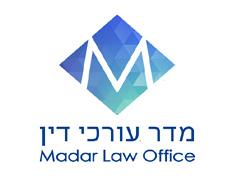
Orit Madar, Adv. Family Law and Mediation Divorce, Child support, Custody Inheritance & Wills
Yariv Madar, Adv. Bodily Injuries, Medical Malpractice Civil Litigation
10 Hillel St , Jerusalem | 36 Dam hamkabim st , Modiin 02-6255592, 050-3202909
Madar@netvision net il
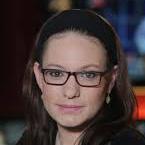

Among all the official speeches and ceremonies, here are a few words that may surpass them all. They were sent to me by a 15-year-old:
“Shalom Sivan,
Much excitement has surrounded Emunah Cohen and Neta Lax, the two fresh winners of the annual International Bible Quiz. Yesterday I interviewed them and heard their story.
the first time?' Yet I simply forgot it. I thought afterwards that HaShem caused me to forget the answer in order to remind me that I do not know everything, that I am human and not perfect."
the first time?' Yet I simply forgot it. I thought afterwards that HaShem caused me to forget the answer in order to remind me that I do not know everything, that I am human and not perfect."
Much excitement has surrounded Emunah Cohen and Neta Lax, the two fresh winners of the annual International Bible Quiz. Yesterday I interviewed them and heard their story.
It turns out that they studied long hours together and were confident they would be the leading competitors. "We planned on winning together," Emunah revealed. "We thought both of us would answer every question correctly so that we would both be champions, tied for first place.
My name is Evyatar Ne’eman. My father Dr. Eitan Ne’eman, a Dr at the Soroka Medical Center, while saving lives under fire, fell in battle. I discovered that there is nothing written for teenagers about the topic of loss of a loved one and grieving. Together with my classmate, Chaim Bar Ilan, I decided to write a booklet of this sort in memory of my father.”
"The more you learn," Neta said, "the easier it gets. When you learn a lot of Tanach (Bible) you simply see how everything connects to your life. I truly felt that what I learned accompanied me wherever I went. It made my heart feel good."
It turns out that they studied long hours together and were confident they would be the leading competitors. "We planned on winning together," Emunah revealed. "We thought both of us would answer every question correctly so that we would both be champions, tied for first place.
But in the end Emunah won. "They made a big deal about our big hug after I lost," Neta said. "But it was the easiest thing to share in her happiness. Besides, we were just relieved that the competition was finally over."
I was amazed. At such a tumultuous time when all of us are so confused, a young boy in a Jerusalem yeshiva, freshly orphaned, brings some order into our lives. Here are a few quotes from the booklet published by Evyatar Ne’eman under the title: “Consoling Insights.”
But in the end Emunah won. "They made a big deal about our big hug after I lost," Neta said. "But it was the easiest thing to share in her happiness. Besides, we were just relieved that the competition was finally over."
In the course of the entire contest, Emunah made only one error. "I knew the answer to the question: 'When did King David cry for
In the course of the entire contest, Emunah made only one error. "I knew the answer to the question: 'When did King David cry for
“It is vitally important to make room for pain, for difficult questions, for weeping. We presently find ourselves in the process of birth. Despite the pangs of birth, we must remember that the pain which goes along
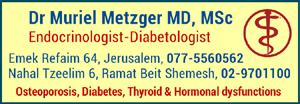
"The more you learn," Neta said, "the easier it gets. When you learn a lot of Tanach (Bible) you simply see how everything connects to your life. I truly felt that what I learned accompanied me wherever I went. It made my heart feel good."
In closing, Neta declared: "The two of us will continue to study the Tanach. There were parts of the Tanach that were not in the material covered by the quiz, and it's important for us to learn them too."
with them is essential for the baby to eventually come out into the world. If we only look back on our history, we will see that each time a terrible tragedy occurred, we grew and became greater because of it. We have no idea what we will ‘gain’ this time, but the greater the tragedy, the greater the salvation that is sure to come.”
In closing, Neta declared: "The two of us will continue to study the Tanach. There were parts of the Tanach that were not in the material covered by the quiz, and it's important for us to learn them too."
And Emunah had this recommendation: "Study the Bible for 5 minutes every day. Not for school, not for the Bible quiz, but just for how much fun it will be."
And Emunah had this recommendation: "Study the Bible for 5 minutes every day. Not for school, not for the Bible quiz, but just for how much fun it will be."
“It is a widespread mistake to assume that when the soul ascends to heaven it loses its function and is no longer active in this world. The truth is that when the soul ascends, it is bound up in the ‘bond of eternal life.’ The soul is highly active from there in assuring the success of the nation of Israel in general and of the departed’s relatives in particular. Now when we encounter difficulties in life, the soul of our departed dear one will be of tremendous assistance to us ‘from behind the scenes.’”
Sivan Rahav-Meir is a media personality and lecturer. Married to Yedidya, the mother of five. Lives in Jerusalem, and formerly served as the World Mizrachi Shlicha to North America. Sivan lectures in Israel and overseas about the media, Judaism, Zionism and new media. She was voted by Globes newspaper as most popular female media personality in Israel and by the Jerusalem Post as one of the 50 most influential Jews in the world.
Sivan Rahav-Meir is a media personality and lecturer. Married to Yedidya, the mother of five. Lives in Jerusalem, and formerly served as the World Mizrachi Shlicha to North America. Sivan lectures in Israel and overseas about the media, Judaism, Zionism and new media. She was voted by Globes newspaper as most popular female media personality in Israel and by the Jerusalem Post as one of the 50 most influential Jews in the world.
“The departed do not leave us. They watch us and accompany us at every moment. They participate in our joyful celebrations and are there when we grieve. And when we perform good deeds they are, of course, proud of us.”
Dear Evyatar, thank you. I am certain that your father is very proud of you.
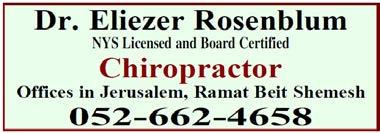

You can download Evyatar Ne’eman’s booklet (in Hebrew) here: https://drive. google.com/file/d/1LyGbKlYUV9XaS1_2gfDGoFLAU_1_gbof/view
Sivan Rahav-Meir is a media personality and lecturer. Married to Yedidya, the mother of five. Lives in Jerusalem, and formerly served as the World Mizrachi Shlicha to North America. Sivan lectures in Israel and overseas about the media, Judaism, Zionism and new media. She was voted by Globes newspaper as most popular female media personality in Israel and by the Jerusalem Post as one of the 50 most influential Jews in the world.
Walking down King George St. in Jerusalem and want a cold bottle of water?
Come help yourself to a bottle at 52 King George.
In loving memory of Yoni’s wife Tziporah a"h, a true Eishes Chayil, always full of chessed, kindness and laughter, and brought life and strength to so many people, that she touched! She was like Aron, who loved peace and pursued peace.

Yoni thanks Hashem for having the opportunity of having Tziporah in his life, to learn of her caring, patience and happiness, to overcome her challenges. May Tziporah's Neshama be a light onto the world, in a time of darkness, and may her Neshama shine to Gan Eden. Yoni misses Tziporah with tears in his eyes, as Hashem gave him a gift, a crown jewel, now he returns her to Hashem. With thanks and Toda. Love, Yoni
To help refill the supplysend tax deductible donations for Be’er Tziporah a"h Bottled Water Gemach to Chabad of RechaviaRabbi Yisroel Goldberg email Rabbi@JerusalemChabad.org 02 800-1717 www.JerusalermChabad.org/DonateShekels



Rabbi Elchanan Poupko talks about something interesting in this week’s parsha which focuses on financial transactions:
physical possessions, emotional wrongs involve intangible but equally significant harm. The answer lies in the idea that other’s emotions do not belong to us. Similarly, their possessions do not as well and thus, harming someone’s emotional well-being is similar to theft.
The rabbis interpret this as a caution against unethical financial practices such as stealing or harming others property. Interestingly, just a few psukim later, the Torah says something that is almost identical:
Therefore, we must be mindful of our words and actions, recognizing that causing emotional harm is as serious as any other form of theft.
Here, the rabbis suggest that the Torah isn’t talking about financial wrongdoing but emotional mistreatment or causing pain to others.
Rabbi Elchanan poses a question: Why does the Torah use almost identical language to talk about both financial and emotional wrong doings? While financial sins involve

The message is clear: Just as we respect each other’s property rights, we must also honor each other’s emotions. We are all entitled to our dignity and well-being. Let’s all strive to treat one another with kindness, respect, and love, mindful of the holy presence that witnesses our every interaction.

In this week’s parsha we read about laws relating to the physical Land of Israel, mainly shemitah and yovel, as well as the laws of Jewish slaves. The Torah explains how one who was sold into slavery can be redeemed by family members and stresses the importance of redeeming a relative from slavery. However, at the end of the parsha, as we finish the rules of slavery we read
some reason a slave wasn’t redeemed, he will be set free in the yovel year, no matter what.
The Da’at Z’kenim takes the laws of redeeming slaves that we just read and expands them to incorporate the idea of ge’ula , national redemption. As with slavery, even if the Jewish people in exile are not able to solve all of the issues required in order to merit redemption, Hashem has a set time for national redemption. Like the redemption of the slave in the yovel year, this national redemption will take place at the set time, no matter what.
Why would Hashem want to redeem us if we haven’t been keeping mitzvot as we should? We can find the answer in the next pasuk. Hashem proclaims: “I am Hashem your God”. This is even stranger in light of the next verse, where we have the equivalent negative commandment of “You shall not make idols for yourselves”.
The Da’at Z’kenim interprets this repetition as an answer to our question. The reason Hashem will ensure that we are ultimately redeemed at the set time He has chosen for us is because even if we haven’t been good at keeping mitzvot and we find ourselves in a deep dark pit, at least we will have kept the mitzvah of “you will have no other God but me” which for the past 2 millenia has been the one thing holding us together.
May we merit to keep more mitzvot and bring the redemption sooner!

EMT Saves Baby from Severe Allergic Reaction Following First Taste of Tahini
On a recent Tuesday morning in Jerusalem, parents were feeding their 6-month-old baby and introduced him to tahini for the first time. Within minutes, the baby developed a severe allergic reaction. The infant's parents immediately called emergency services, seeking urgent help.
On Wednesday afternoon, a man complained of difficulty breathing and collapsed moments later in his house in Jerusalem. His daughter immediately alerted emergency services.
United Hatzalah volunteer EMT Shalom Klein, alerted to the emergency through his proximity alert system, sprang into action as the first responder on the scene. Arriving promptly, Shalom was confronted with a distressing sight - a baby boy with swollen lips and tongue, struggling to breathe, and covered in a worrisome rash.
United Hatzalah volunteer EMT Giovanni Facouseh was nearby when he was alerted by the organization’s dispatch. He immediately drove to the location of the emergency. The volunteer arrived within 3 minutes at the scene, where he found the patient, in his 80s, on the floor, while a family member was performing chest compressions and mouthto-mouth resuscitation.
Recognizing the symptoms as indicative of an anaphylactic shock, the volunteer knew immediate intervention was crucial. Without hesitation, he administered a life-saving EpiPen injection, delivering a dose of epinephrine to counteract the severe allergic reaction. The powerful medication quickly took effect, and the infant's breathing became less labored. The swelling in the lips and tongue began to subside, providing much-needed relief to the child.
As the symptoms continued to recede, the EMT monitored his condition while awaiting the arrival of a mobile intensive care ambulance. Several minutes later, the ambulance team arrived and transported the infant to the nearest hospital for further treatment and observation.
Reflecting on the incident, Shalom emphasized the importance of having an EpiPen readily available. "It's a great thing I had an EpiPen in my medical kit," he stated. "An EpiPen can save a person's life within minutes and is a huge help for both EMTs and patients."
Giovanni checked vitals and found that the man wasn’t breathing and had no pulse. He took over performing chest compressions and reported back to dispatch, requesting that more responders be sent to the scene.

Moments later, another first responder arrived at the scene. The pair attached a defibrillator and a bag valve mask to provide assisted ventilation. After three rounds of CPR, an intensive care crew joined the effort and attached a heart monitor, administering electric shocks and medication. Following the third shock, the man’s pulse was restored. He was transported to the hospital for further treatment.
“This was possible thanks to the fast response of the man’s relative and my quick arrival at the scene,” Giovanni reflected after the incident. “I’m glad we were able to restore his pulse and hope he fully recovers.”

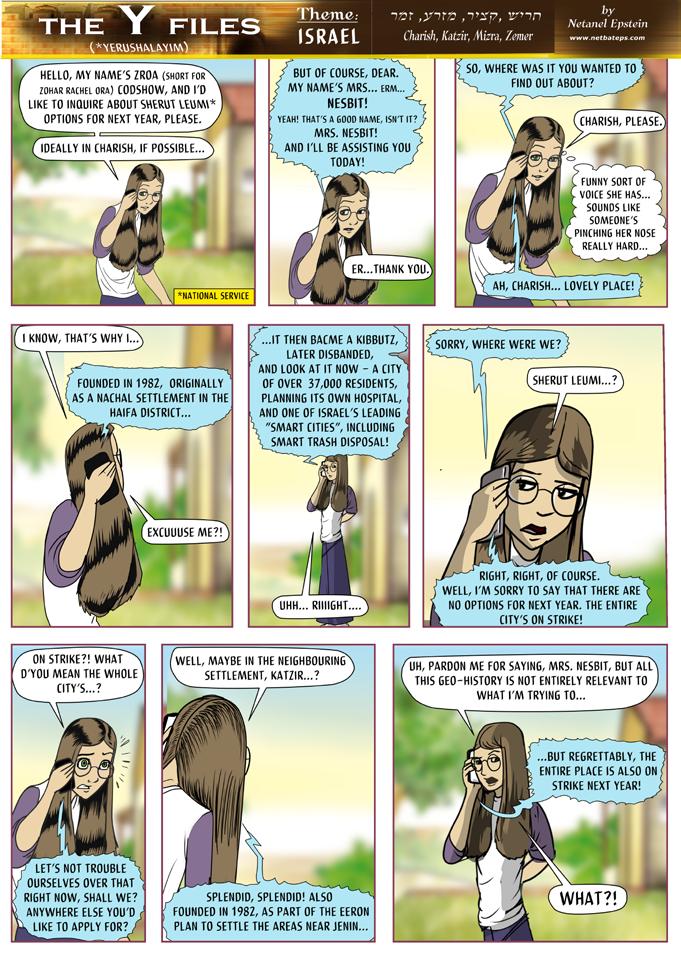
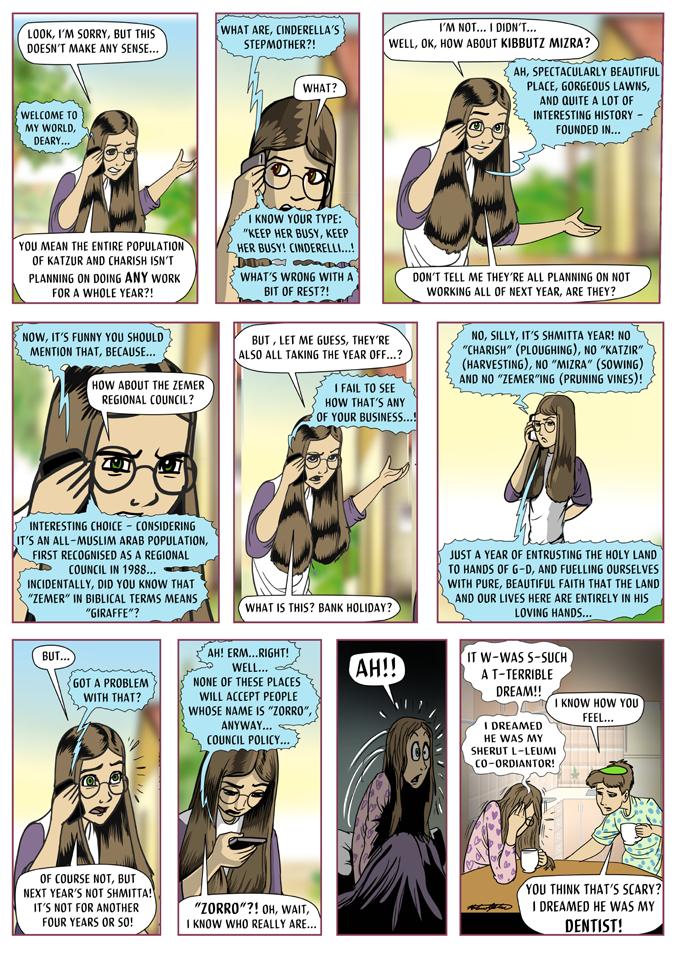
Expose Palestinian law which provides a life salary for anyone who kills a Jew, anywhere.
Reveal Palestinian payoffs to elected officials, corporations, and Universities.
Document Palestinian Authority involvement in Simchat Torah murders on October 7.
Research Palestinian thievery of humanitarian supplies.
Uncover Palestinian sale of medical equipment and medicine on the open market.



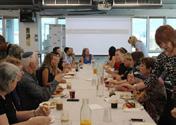


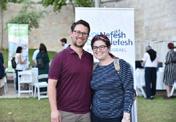
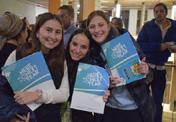


Hosting an event? Post your events on the calendar and share your program with the expansive Nefesh B'Nefesh community all over Israel. Visit The Nefesh B'Nefesh Israel Calendar to explore English-language events taking place all over
The Israel Calendar is an online platform showcasing virtual and in-person English-speaking programming throughout the country. All events posted on the calendar are designed for Olim seeking to connect with likeminded Anglos while benefiting from English-oriented events.




